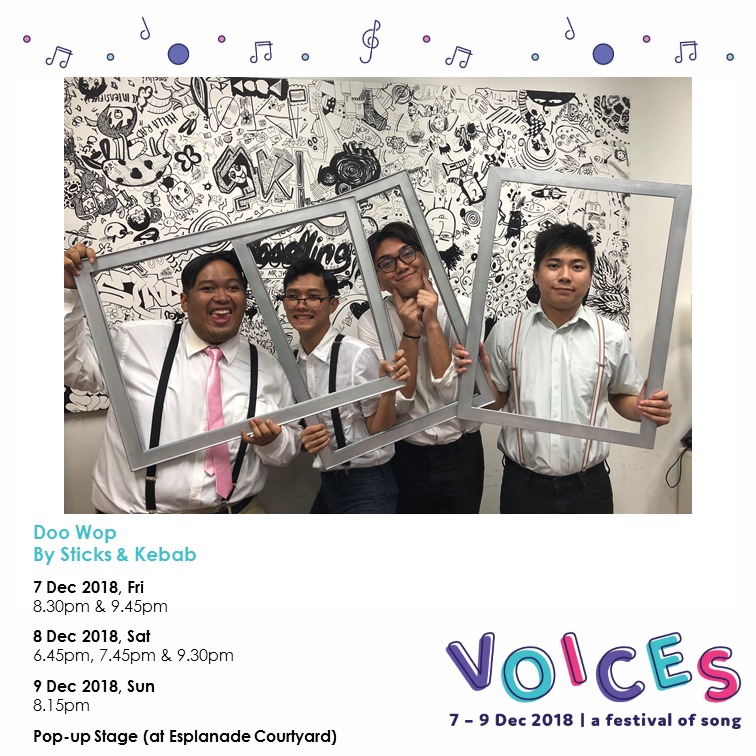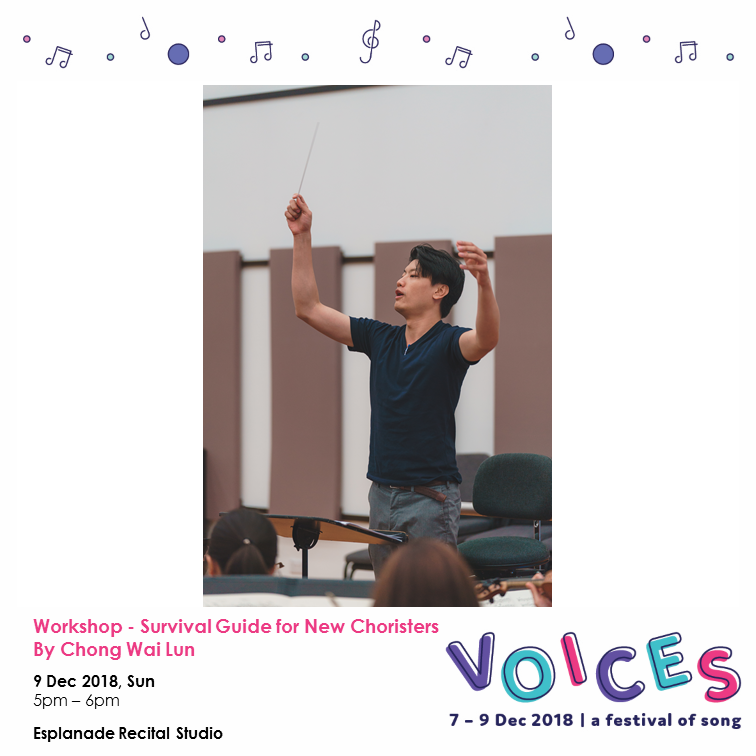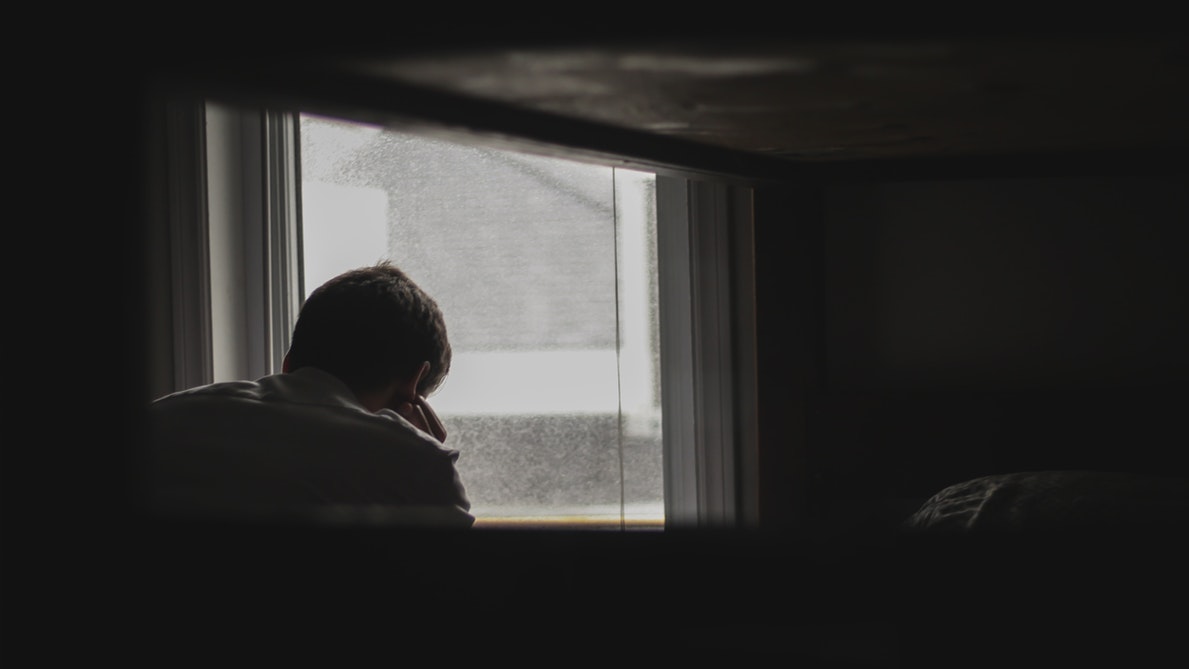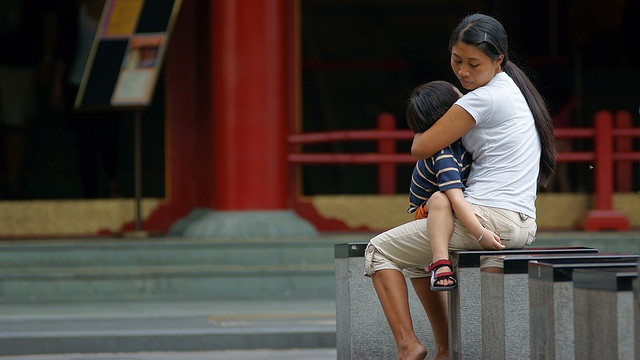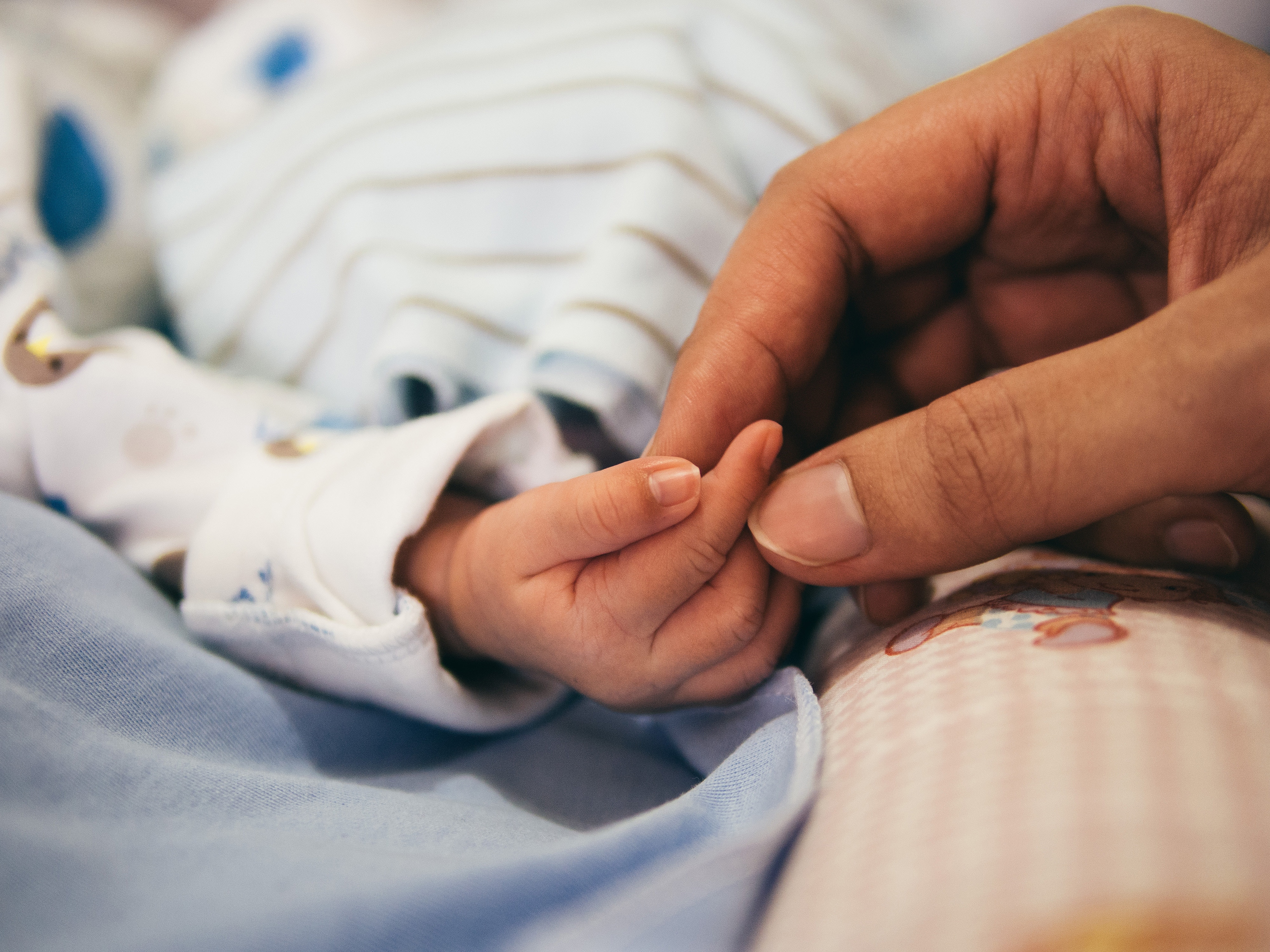Last Friday, an NUS student, Monica Baey took to Instagram (IG) to seek justice for her case: she was inappropriately filmed by a fellow student while showering in the school hall last November.
Her string of IG Stories has since gone viral, picking up attention from several media outlets.
There has also been some progress in Monica’s case. However, having followed her story and seen the way the events have unfolded have raised some very uncomfortable truths about the kind of society we live in today.
You can find the full story from Monica’s IG profile highlights here.
Singapore still has a long way to go when it comes to how we view sexual assault and harassment
From the way the police told her to “just accept the outcome,” and, “if you want real consequences or more action to be taken, go to NUS and push for action,” to the correspondence between Monica and NUS, the way the relevant parties handled this seemed apathetic at best.
And this is a sad reflection of the society we live in today. A society that only gives attention to an issue when it is blown up enough.
Had Monica accepted the results and quietly made peace with just being that unlucky one who had to experience such an incident, this case will easily and quickly be swept under the rug and forgotten. Just like the many other peeping tom incidents that have happened.
Just last year, a 26-year-old male student was given the same 12 months conditional warning when he was caught committing the identical act that the perpetrator in Monica’s case committed. This student was later sentenced to nine months' jail and three strokes of the cane for molest and outrage of modesty, which he committed during the conditional warning.
Another man was jailed in 2017 after he committed sexual misconduct-related crimes while “under a conditional 12-month stern warning for attempting to take an upskirt video on a woman”.
Yet, NUS has, within two days of Monica’s story going viral on social and mainstream media, announced its intention to convene a committee “to review its current disciplinary and support framework”, making it a prime example of why people rely so heavily on social media to incite for real impact.
It is also very sad that we have come down to this. Why do we need the court of public opinion to know what should inherently be right or wrong in our morals?
Our nonchalance towards cases of sexual misconduct
We like to think of ourselves and our society as encompassing all the morally right values: fair, righteous, honourable, and et cetera.
However, Monica’s case is a perfect example of how we’re a long way from that—how Singapore is a long way from that, especially when it comes to sexual assault and harrassment.
Often, we are told to go to the official channels whenever we want to seek redress for an incident. But if the official channels fail us, where else do we go to?
While there were results that came out of the case, it did nothing good for society. I agree with second chances, but the conditional warning is but a joke if one were to consider the fact that the perpetrator had previously snuck into another toilet. Furthermore, there have already been convicted cases of sexual misconduct as shared above, similar to Monica’s.
If it is also true that many students have been a victim of such predatory behaviour in the campus residences before, I question the good in settling such cases with restrained or even hush-hush procedures.
We’re talking about second chances for someone who has committed an inappropriate act with the intent of doing so, albeit under alcohol influence—this cannot be an excuse.
Regardless of gender or location, there is no excuse for entering a shower facility with the intention to film someone else.
We’re talking about the questionable lack of a zero-tolerance policy against sexual misconduct and predatory behaviour.
For NUS particularly, sending an apology letter that Nicholas was obligated to write under the school’s direction to Monica is nothing but patronising. Anyone who read it could tell the lack of sincerity in the words, and a standard PR template-like apology does nothing to assure a victim.
The one-semester suspension and ban against entering campus residences do nothing for long-term deterrence and assurance if NUS does not display any empathy and concern for the case beyond closing it.
Monica has also shared in a Ricemedia article that NUS had told her that “she’d sent them her statement ‘a bit late’, and that they’d already arrived at a punishment” when she went back to NUS to push for action. In the same article, Monica also shared that NUS had claimed to take her statement into account, but said the outcome “would have been the same”.
This, to me, is a clear indication of the school’s consideration of her case, or rather, the lack thereof. While the victim was crying out for help from the people whom she believed would serve the justice she deserves, the people whom we trust to keep us protected only reacted with the minimal concern—your statement will be taken into consideration, that’s all.
But this should not be about closing the case and moving on. This should be about our tolerance for sexual misconduct across the board.
It should not matter whether the perpetrator is a student or a working adult. It should not matter if he succeeded in capturing the victim on his phone.
Closing this case as it is will only allow for such inappropriate misconduct to continue on, as it signifies to the community that such behaviours aren’t that severe (as it should be). In time, this will only lead to other victims having to go through exactly what Monica has had to.
If Monica’s and all those previous, similar cases are not enough, how many cases must it take for us to make substantial change?
Why Do We Need To Wait For Storms To Blow Up?
Image captured from Monica's IG highlights
It’s heartening to know that social justice is at least a lot more prevalent in Singapore compared to other places—a 19-year-old girl in Bangladesh was burnt to death after she spoke out against sexual assault, and <a href=" in India struggle with extreme cases of sexual harassment and assault on a daily basis.
However, we have our own problems.
Not only does our society seem to be nonchalant about issues until it starts getting viral, Monica’s case also reminded me of how desensitised we have become to such issues.
Perhaps it is our progessively liberal mindsets, or just the increase in the number of sexual assault-related stories that we have been exposed to, perpetuated by the #metoo movement. This has inadvertently created a victim-blaming culture among us. At the very least, because of the way we’ve seen Singaporeans react to such stories with scepticism and judgment, most victims would rather stay mum, forget the incident, and move on.
But I wonder if we are fighting the wrong wars here.
Should we not be looking into ways to empower victims in speaking up, and in protection and recovery efforts instead?
In a statement issued to NUS by almost 500 students following Monica’s case, four sets of recommendations were proposed. The recommendations included an “Office of Sexual Harassment Prevention, Reporting, and Response with a 24/7 emergency hotline service for survivors,” and also campaigns to raise awareness on sexual harassment in the university.
These are great examples of initiatives that would allow students to have a greater understanding of what constitutes sexual misconduct.
More importantly, we should consider how important it is for all of us to adopt a zero-tolerance mentality towards any kind of sexual misconduct, especially in a society that prides itself for safety and equality for all genders. It is about cultivating a community that can accept and openly discuss matters so sensitive (sexual assault and harassment), and it is only possible with time and dedication from every part of the institution.
Rethinking the way we look at sexual misconduct and support for the victims
I trust that NUS and the police both have a fair amount of challenges and stakeholders to be accountable to.
However, they need to understand that this is beyond being an impartial third party. They need to know people’s trust in them to serve and protect us in ways we cannot do so without their support.
It is not about enabling women to seek attention or affirmation through social media. Neither is it about clamping down on such behaviours with the harshest punishments.
It is about their apparent lack of empathy, compassion, and concern over what is clearly immoral, predatory behaviour that causes trauma victims.
Also read: S’porean Women Share Stories Of Being Sexually Harassed, Revealing It’s More Common Than We Realize.
(All images used in header image taken from Monica Baey's IG)
69-year-old Mr Zhen once attempted to take his own life. “Since there’s nothing [left] to do, I may as well die.”
In my attempt to learn about the lives of elderly in Singapore, I had spoken to five other seniors in their 60s to 80s. The one thing that struck me was how there is an unspoken, but very perceptible sense of aimlessness.
In an article by The Epoch Times last year, a 2008 research article was brought up, where all 19 interviewees “reported feeling lonely or depressed, and many said they live by the day and endeavour not to think of the future.”
Where one has pretty much fulfilled the most of our life goals, like getting a job, saving up, starting our own family, or seeing our grandchildren, it can be hard to fathom that there is nothing else to look forward to.
And Mr Zhen is just one elderly person who has struggled with his thoughts of mortality as he age. There has been studies on how there are more old people who struggle with loneliness and how socially isolated seniors have a higher risk of dying prematurely.
When I visited <a href=" Home for the Aged Sick last Saturday, I got to speak to 72-year-old Winnie Koh, who has been running the nursing home as Chief Executive Officer (CEO) for more than 15 years.
She shared that one of her residents has suicidal tendencies, and had once tied bedsheets and put it around his neck in a suicide attempt. Likewise, that resident did not see a point in living, “when [to him,] he’s already 90, nearing 100 years old, and does not have the ability to do many things himself.”
This resident has also went through certain rough patches as well, as a very close female friend of his had passed away.
“I can feel the loneliness in him. He doesn’t speak to [a lot of] people.”
I asked Winnie if residents fear death.
After a short pause, Winnie explains that the elderly do not fear death per se. For the most, those who fear death fear going to hell.
However, Winnie acknowledged that there are those who struggle to let go, in the sense where they could have unresolved wishes: people they want to meet, messages they want to tell their loved ones, or something they want to complete.
32-year-old Alvin, added that having worked in the eldercare sector for about six years, he has often hear elderly regretting not treating their family members better or not better providing for them, “they definitely fear for the people and the relationships they are leaving behind.”
This is where, at a nursing home, they play up their role of caring for the residents. Winnie explains, “it’s the comfort [they need], to affirm them that they are ok, and that [whatever they want accomplished will be taken care of.] I will arrange for family members to visit. Usually they do go off peacefully after that.”
Along with the physical or cognitive impairments, the elderly face a whole set of very personal and emotional hurdles as well.
Before working in the eldercare sector, Alvin, like many of us, never understood the stubbornness and ego that many elderly have. But now that he has got a glimpse into the lives of different groups of elderly through his six years, he explains that most elderly fear losing their independence, and when an elderly go from “a provider, a giver, a successful person on their own rights losing the respect, mobility and cognitive ability they have [when they age], the frustration they are going through can be very overwhelming.”
As sad as it sounds, these seniors turn to stubbornness and ego as a way of holding on to that last bit of control that they still have.
Although, there are also “difficult ones,” those who who choose to isolate themselves, and who refuse to interact with people. In such cases, Winnie explains that in the nursing home, they still try to show the elderly their presence and care in one way or another.
Drawing similarities between elderly and babies, Winnie said, “once you make them feel safe and comfortable, they are easily cared for.”
At Moral Home, the residents may suffer from different illnesses and each, their own sets of disabilities, but Winnie tells me that most of them are generally happy.
Having reached the point where they know that they are old and are ready to die, most of them would live every day to their fullest in the little ways they can, like eating, reading, or praying.
“Once, I have this resident who [had severe dementia and] is, on the whole, a very happy person. One day, she was just resting in the lounge after her coffee, then she just said to me in Cantonese ‘I am going to sleep, bye bye.’ She never woke up after that.”
“I think it’s better that way,” Winnie said, on passing on peacefully.
When I visited the home I also got to speak to this two sisters who had sold their house to live at the nursing home.
For 82-year-old Tan Nya Nya and her 83-year-old sister, their choice to live in a nursing home is for convenience, and to ensure that they get the physical support they need at their age. This came after Nya Nya fell down once and both her sister and her realise that they were unable to manage on their own if anything were to happen. Being able to socialise with the other residents of the home are perks that they enjoy too.
Nya Nya added, on seeing residents who don’t share the same happy-go-lucky attitude she has on life, “if you naughty, throw tantrum, [your family] also won’t [feel happy to visit you]. Correct? No point [being so gloomy]. Don’t think so much. Must be happy.”
Like Nya Nya, 82-year-old Uncle Lee also have an optimistic outlook on life, despite the fact that he lives alone in a one-room flat in Toa Payoh
His daily routine includes waking up in the wee hours of dawn for a walk around the small park right beside his home, going for his meals, and watching TV. Sometimes, he would hop on a bus that would take him to Jurong, Pasir Ris, and even Changi.
As he regaled me with his accounts of these ‘mini adventures’ he goes on when he is bored, he emphasised that at his age, there is nothing much to do except eat and watch TV, “what else can I do at this age?”
When I visited him with three volunteers on a Sunday night, he had cooked a pot of Bak Kut Teh for us. And as we sat in his living room savouring the soup, I felt a little like I was in my grandmothers’ old house again.
Although he lives alone, his house is filled with knickknacks. Chinese New Year decorations still adorn his walls and the side of his fridge. I couldn’t help but noticed that he also has four clocks on one wall.
“He really likes clocks. There’s more in his bedroom,” one of the volunteers laughed when I asked.
These volunteers first knew Uncle Lee through a programme initiated by Youth Corps Singapore, but have since grown closer to Uncle Lee and for the past two years, have been visiting him every month.
Once a driver who made a livelihood off driving for commercial and private businesses, Uncle Lee retired more than 20 years ago, when he sprained his hip. This work injury, however, has become a permanent problem at 82 years old.
“I cannot really walk long distances, unless I take breaks.”
Curious about my own mortality when I reach his age and avoiding being so rude as to ask Uncle Lee - whom I just met - about how he feels about death, I asked if there is anything he fears now that he is this old.
“No lah! Scared of what? Don’t need to be scared of anything [at this age].” He jested, “Last time, scared of my mother, but mother not around already, so there’s nothing to be scared of [anymore].”
Ever since his elder sister passed away, Uncle Lee’s only other family members are his nephew and nieces, whom still visits him occasionally.
Most days however, his humble lifestyle revolves around watching TV and eating, which he loves doing.
“Uncle is a food king!” One of the volunteers teased, “whenever we go out, he will tell us what’s good and where to find good food.”
Unable to comprehend living alone at his age, I asked Uncle Lee if he ever feels lonely.
“Won’t lonely lah! [If I’m] lonely, then I’ll just watch TV, or put on a DVD, or go out and eat lunch. Lonely for what?”
His positive reply showed very much his outlook of life and in a way, it was also a reminder that happiness is a choice. He could very well dwell on what some would assume as unfortunate - he is old, never married, and living alone and off financial support from the government - but he had chosen to lead a simple and happy life instead.
A study done in 2004 found that seniors living alone were twice as likely as their peers to develop depressive symptoms. In the last stage of their lives, it can be very easy for seniors to feel frustrated and aimless.
Which is why, it is important not just for seniors to be able to adopt a positive mindset, but also for the people around them to empower them to do so.
Besides, our elderly citizens may be old and frail, but they have so much to offer in other ways.
Yong Shin, one of ‘Uncle Lee kids’ said, “They always say ‘seniors are a wealth of knowledge’, and I think [Uncle Lee] really displays that. You can tell that he really likes to share with you, about history or just whatever knowledge he has. He really likes interactions.”
And of all the conversations I have had with the seniors, the one thing that all of them have said, albeit not ad verbatim, is “we’re old already, what else can we do?”
To them, it is just better to lead a happy life and enjoy the simple things when you are already at that stage of life.
Also read: People Leave, But You Don’t Have To Be The One Left Behind.
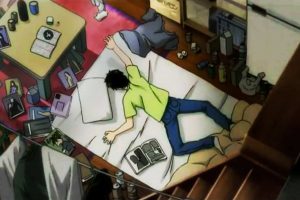
WHAT'S HIKIKOMORI?
For the uninitiated, hikikomori is a term used to describe those who rarely leave their house, and seek extreme degrees of isolation. Some never set foot outside their homes. Others occasionally do, heading out to buy food or even to the cinemas for the latest blockbuster, but all of them are completely, socially isolated. They would even limit their interaction with their own family members. Although this social phenomenon is predominantly widespread in Japan, I recently stumbled upon a Reddit thread that tells me that we too, have our share of social recluses hidden in their rooms somewhere, unseen by society. Through a local forum, I stumbled upon Andrea’s story. Back then, Andrea cooped herself up at home for eight consecutive months. Waking up at five every morning, she spends her time browsing Reddit, reading and binging on TV series, only leaving her room for lunch and dinner, which her parents would prepare for her. At around 11 pm, she will head to bed and the same routine repeats for months, and in those months, she did not step out of her house once.Her home had become a place of solace for her, a fortress she can’t bear to leave.Likewise, this is the case for the many hikikomori in Singapore, who have taken to forums to pour the feelings that they have hidden away from their friends and family.
WHY DO THEY ADOPT THE HIKIKOMORI LIFESTYLE?
Hailing from a ‘financially comfortable’ background, Andrea is aware that she is more fortunate than most, as she could afford the option of not having to work or fend for herself. But because of that, she feels more pressured to pay her parents back for all that they have done for her. The low self-esteem, crippling social anxiety, and negative outlook on life that came from her being bullied in school when she was younger kept her imprisoned. The self-imposed pressure and the expectations about the future stressed her out and caused her to feel even more helpless. When she finally entered the workforce, work became her life. All she did was wake up, go to work, head home to have dinner with her parents, and repeat. Due to her micromanaging boss, she grew to resent work. Even so, she continued working for some years to save up a sum of money before eventually resigning, dampened by the rat race. “So after that, I didn’t really have a plan. I just stayed home. Months quickly turned into years. And because I was used to a solitary lifestyle of just reading and watching drama and anime, I just shut myself off from society and basically became hikikomori, just living off my parents and my savings.”ONLY FOR THE PRIVILEGED?
Of course, not everyone is privileged enough to be able to just drop everything and withdraw from society in the first place — most of us are not as financially blessed. Through r/hikikomori, I was able to speak to another Singaporean hikikomori, 24-year-old Josh*, who shared how he was once a hikikomori. Like Andrea, Josh comes from a financially stable family.“Maybe we were too sheltered. Maybe we were too spoiled and everything comes to us easy and without any barriers. Back then, I felt that no matter how useless I was, I would still be able to live comfortably, or still be able to live somehow.”An avid fan of Disney’s classics, Josh had a grandiose dream of being a 2D Animator for Disney. When news broke that Disney closed down their 2D animation company, his hopes and dreams were dashed. Dejected, he let himself waste away, passing the days by gaming and watching anime at home.
WHAT'S THE CAUSE FOR THIS?
For many of us, such behaviour is aberrant and tough to comprehend, much less empathise with. It’s not surprising for us to jump on the conclusion that hikikomori chose to stay cooped up at home because they are just “lazy” and “spoiled”. “We all have problems, so why can’t they just do something about their problems?” But unlike what we think, the hikikomori syndrome is not another convenient excuse to be idle.In fact, most, if not all, hikikomori hate the plight that they put themselves in, and they are ashamed of it.“When I was hikikomori, I lost all desire for wants. Normal things like going to movies or buying expensive new things don’t interest me anymore. I don’t know why I exist, to be honest. Sometimes I can feel my parents’ disappointment in me and I don’t feel good too,” shares Andrea. They have confined themselves to their homes, but most hikikomori actually want to return to society. However, the fear and anxiety of how society may react to them. Even if they manage to take the first step out of their homes, they are plagued by this constant fear that they are being judged by those around them, afraid that the world wouldn’t come to accept them because of their past. Maika Elan, a Photographer exploring the topic of hikikomori, shared on National Geographic that “Over time, hikikomori lose whatever self-esteem and confidence they had, and the prospect of leaving home becomes ever more terrifying. Locking themselves in their room makes them feel ‘safe’.” Similarly, Andrea admitted that the very paranoia of being judged for being a hikikomori is the toughest obstacle she had to overcome. She would often slip back into isolation because of it. Thanks to volunteer work at a church, Andrea was able to break out of the hikikomori syndrome. She eventually managed to land herself a job through one of the other volunteers. As for Josh, he stumbled upon the animes Re:Zero and Konosuba, which shifted his perspective on life. Both shows feature male protagonists who were hikikomori and Josh was able to relate to them strongly. “In Re:Zero, it tells us that no matter where you are, nothing’s going to change if you don’t put in any effort to take charge and improve yourself.” Witnessing his friends’ success also pushed him to eventually change his lifestyle.
“What gives them the drive to keep doing what they do? Why are they set on improving themselves and going out there to find jobs and socialise, and to be proactive with their lives?”These were the questions that Josh posed to himself, and subsequently embarked on a quest to uncover. “Sometimes it’s hard, but you just have to remember that there are other people out there who are struggling and still trying their best as well.” Today, he works as a Digital Designer, which is not too far off from his initial dream. Although, there are others who struggle to break out. “It all started after he finished his degree overseas and came back. He didn’t find work and just stayed at home gaming and surfing the net. We’d ask him to come out for coffee or meals but he’d always turn us down.” Tim*, a male in his 30s, shares with me about his friend who has been a hikikomori for over 10 years. “I’ve a feeling that the shame of being long unemployed while everyone else is working just drives him to become a hikikomori. I guess his parents still buy him food or give him spending money so he doesn’t need to force himself to get a job.”
A VICIOUS CYCLE OF FEAR AND PARANOIA
Although hikikomori is a social condition that has not been widely recognised as a mental illness, many of them do require mental health care. Some turn to this reclusive lifestyle due to a lack of purpose or existential crisis while others do so as a form of rebellion to cope with trauma such as childhood abuse or bullying. While hikikomori wish to recover, they are so ashamed of their past that it freezes them up, causing them to retreat back into their shelter. However, the longer they isolate themselves from society, the harder it will be to integrate back into it. It’s a vicious cycle that they are dealing with. For such people who haven’t interacted with anyone nor formed any ‘proper’ relationships, it could be tougher for them to reintegrate into society as they grow older, especially if their family members (like their parents) are no longer around to support them. In Japan, this has become a real problem. These days, it’s an absolute nightmare if we were to be void of our handphones, computers, and the internet. While technology is not the root cause of the hikikomori syndrome, it provides a gateway to endless virtual worlds that we can immerse ourselves in. Nat*, another Redditor, says he usually spends an average of 10 hours on his computer and does not see the need to leave his home. Whether it’s food or entertainment, technology has made that conveniently accessible and available for us. There are even avenues to learn and work ‘virtually’, with online classes and freelance jobs. All of these make it even easier for one to slip into the hikikomori lifestyle. With that said, however, completely isolating oneself from society is not healthy, and should not be normalised. Regardless, Josh hopes that hikikomori will have it in them to realise that they are responsible for themselves, and find the strength in them to overcome it, just like he did.“There’s only so much that others can help you with. Only you can change yourself. Even if it’s for your parents or yourself, I hope you will find it in you to want to get better.”“We all are living for a reason. We need to reflect on that more often, to put our lives into perspective. Once things are in perspective, it will all make sense in the end.” “After all, life exists and thrives beyond these four walls, but it’s up to us whether or not we want to open the door to live.” *Names have been changed to protect the identity of the individuals. Also read: It’s The 21st Century, Why Do We Still Treat Maids Like Slaves? (Header Image Credit: Unsplash)
In The World Of Tabletop Games
For 29-year-old Travis Wong, who was crowned the 2017 Oceanic Champion for ‘A Game Of Thrones: The Living Card (AGOT: LCG) Game Version 2.0’, it is disheartening that such achievements (in the tabletop gaming world) go unnoticed, but support need not always be in the form of public recognition. “There was little to no recognition of my win because no one really knew about it, but my close friends congratulated me, which was all I really needed. More than anything else, the win was a self-achievement.” [caption id="attachment_3953" align="aligncenter" width="500"]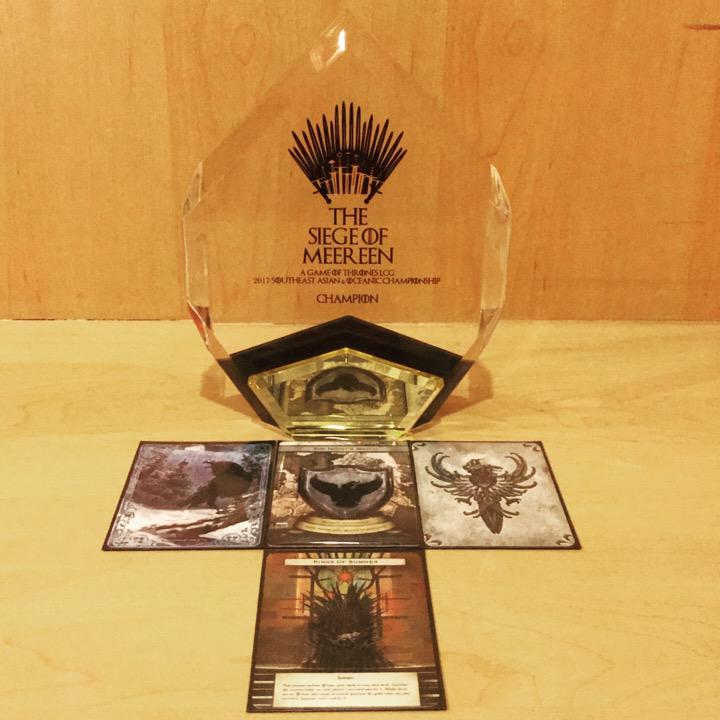 Image Credit: Travis Wong
Image Credit: Travis WongTravis’ 2017 win at the 2017 Oceanic Championship for AGOT: LCG Like Justin, Travis had to clock in hours at the tournament before he won in the finals, which lasted a “mentally-exhausting 1 hour 42 minutes.” Meanwhile, we struggle with keeping a Monopoly game going at the one-hour mark. Some dive into the world of tabletop gaming for leisure, but for competitive players like Travis, the pressure as a Singapore-represent at such international competitions is no different from athletes competing in international sports events. “I was putting a lot of pressure on myself to win. I’ve trained for it [through regular gaming sessions] and analysed videos of high-level tournaments to prepare myself. The night before the top cut, I had nightmares and dreamt about the countless scenarios I would have to face.”
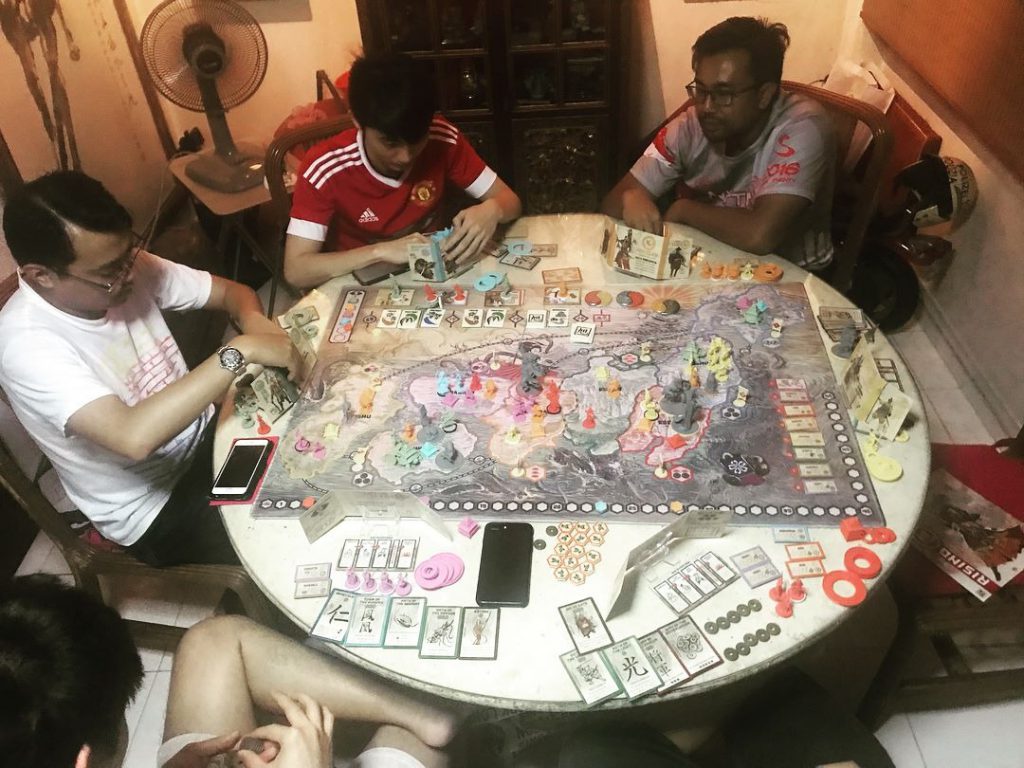
One of the many board game sessions he holds with his friends. In here, they are playing Rising Sun
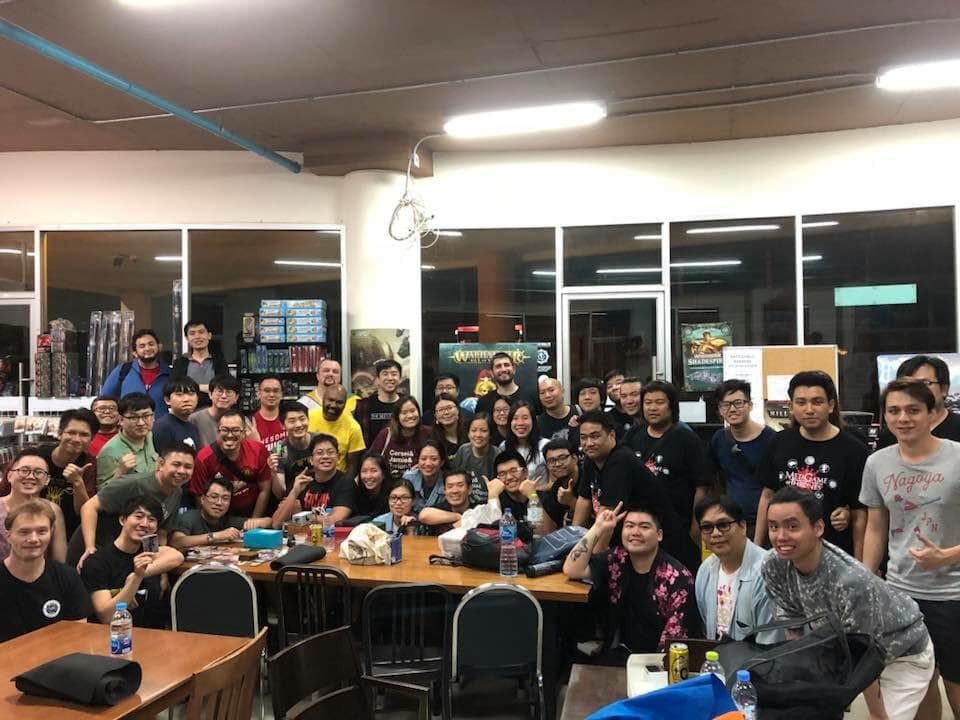
2018 AGOT:LCG Tournament in Thailand - one of the events Travis’ group organises
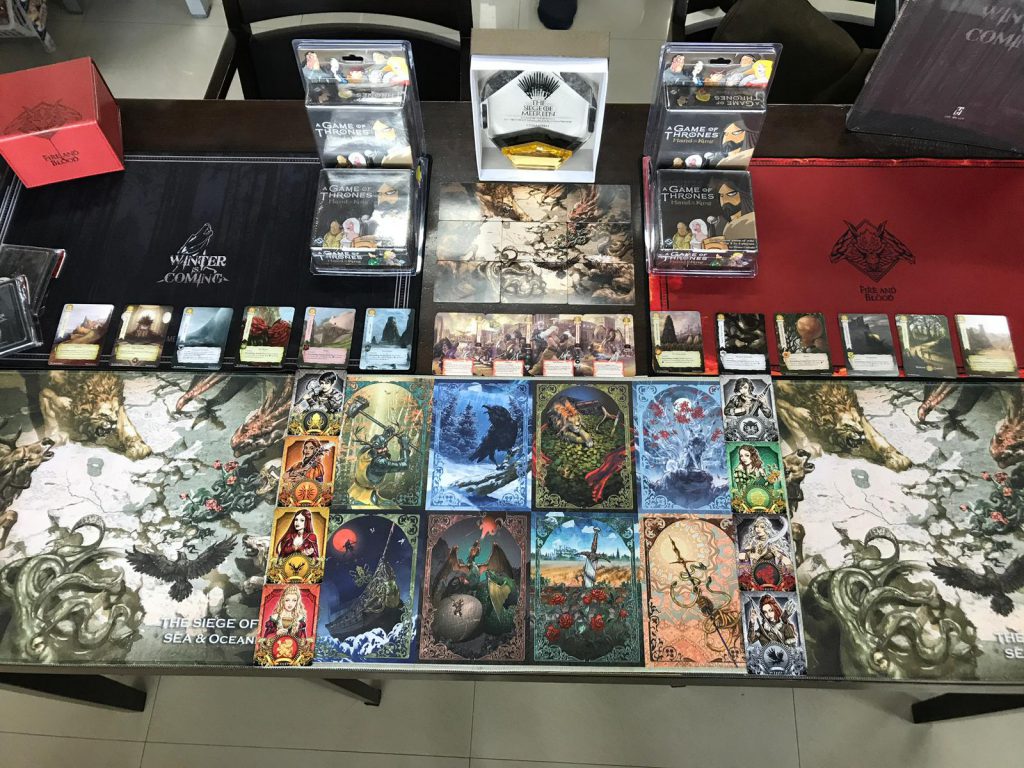
Commission works and special cards make up the prize pool for one of the tournaments they held

Warhammer miniatures

Game categories under the expansive umbrella of tabletop games

Casual card games like Cards Against Humanity, Unstable Unicorns, and the homegrown The Singaporean Dream are tabletop games that are easy to pick up for its price point and accessibility, so is our favourite Monopoly.
Making A Career Out Of Trading Magic
For another 28-year-old Mark, tabletop gaming has gone from a hobby to a career, and it all started from Pokémon. From the Pokémon Trading Card Game he picked up in primary school, Mark went on to Magic: The Gathering.
Growing With The Gaming Community
Nicholas, who is in his forties, saw exactly that — the potential in tabletop gaming in Singapore, and he, like Mark, made a career out of his passion for the games. Previously a freelance copywriter, Nicholas and his friends took over the reins of a game shop they used to frequent when they were designing their own board game. Now onto its seventh year, Gamersaurus Rex is a popular tabletop game store in Singapore. For Nicholas, whose foray into tabletop gaming started when he picked up Dungeons & Dragons in secondary school, it is also heartening to see the growth of the community in Singapore. Back in his days some 30 years ago, “there were just one or two [tabletop game shops]. Now, there are more than 10 shops.”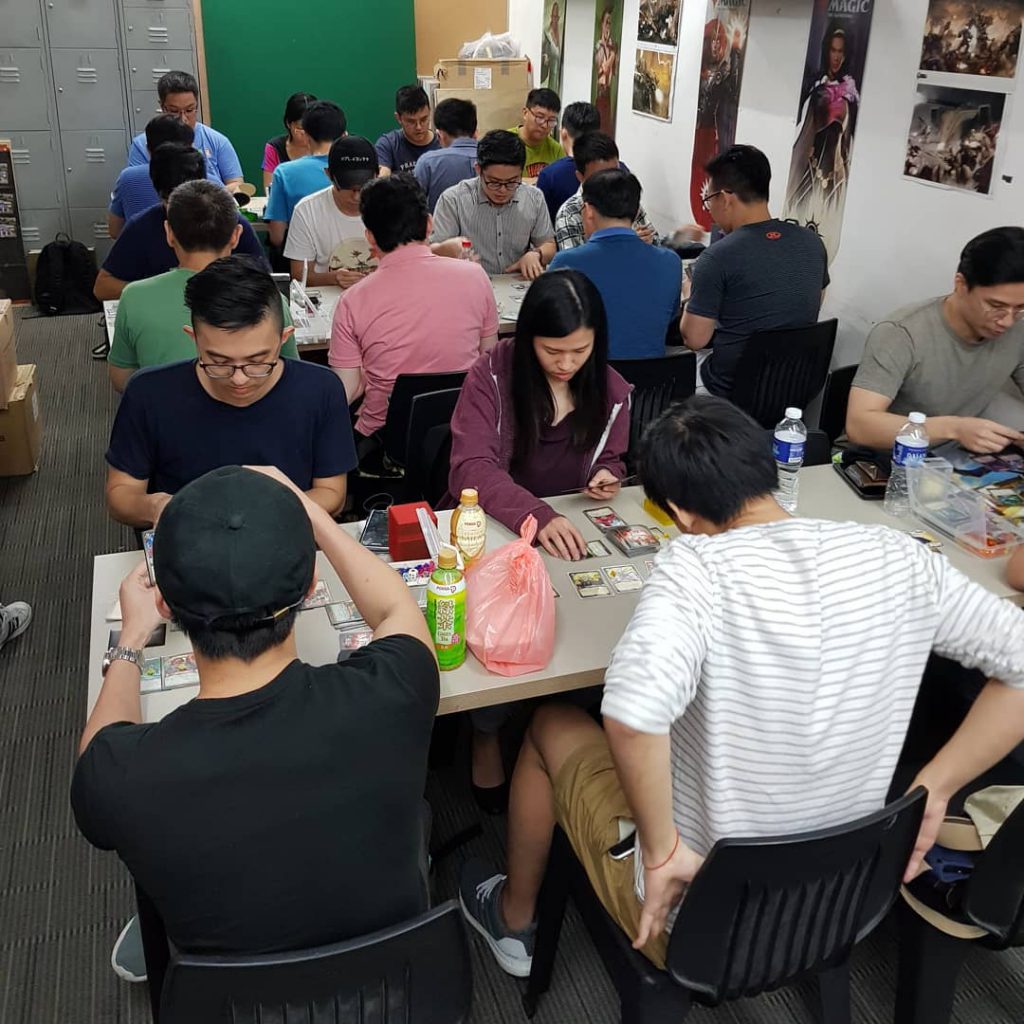
The gaming tables at Gamersaurus Rex are always full on the weekends
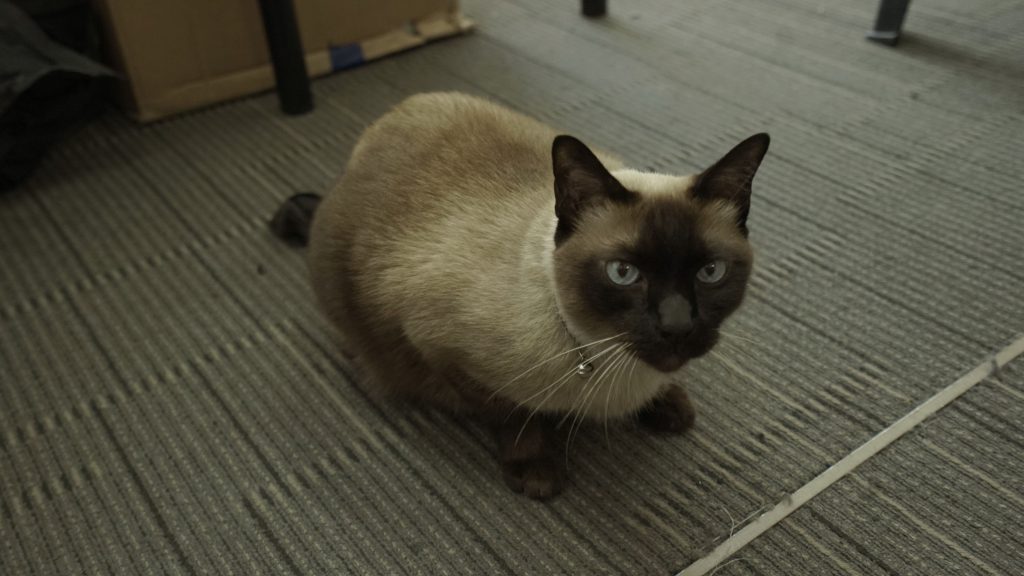
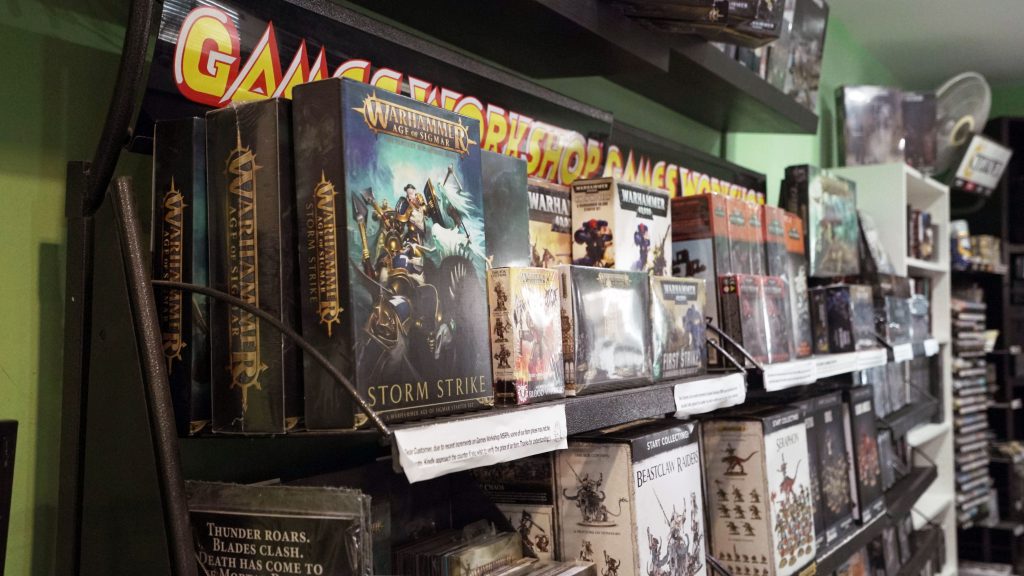
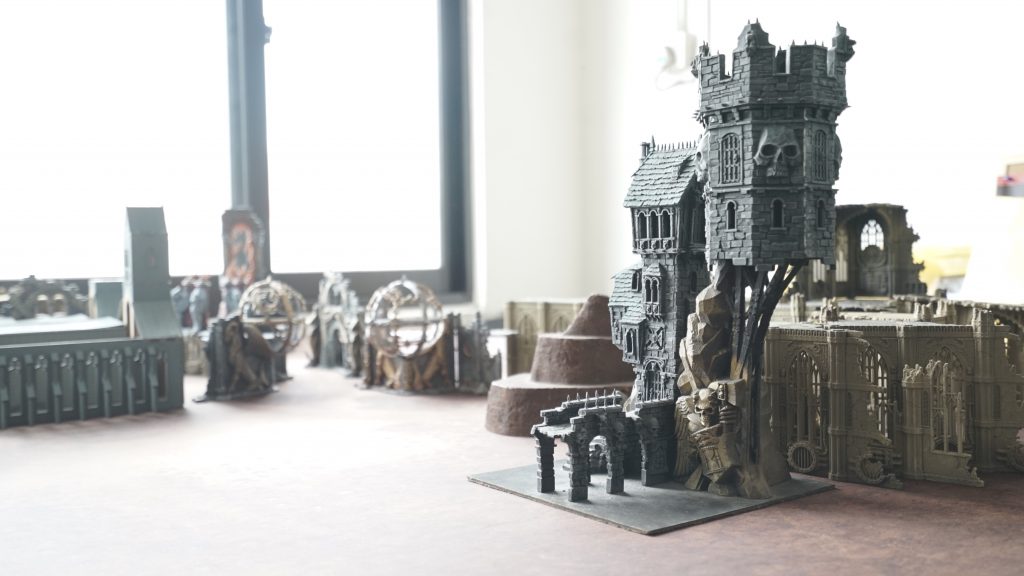
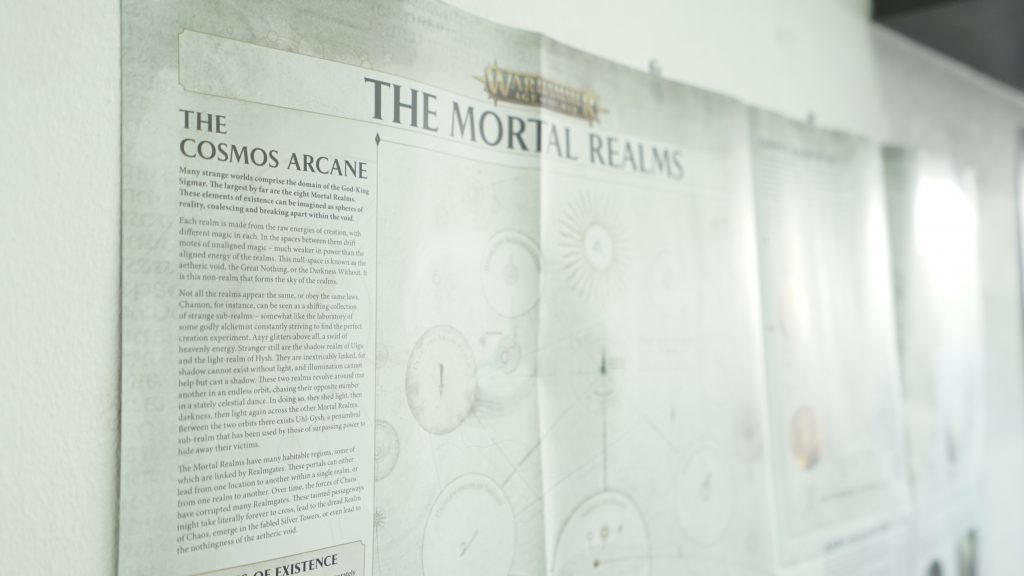
Making Friends And Landing Jobs From Playing
Most of us perceive tabletop gaming to be for reclusive nerds, but tabletop gaming is a community-based game by nature, and a lot more of a social activity than e-gaming, for example. Once a “pretty reclusive person”, Travis have “made countless friends through this hobby, which is weird since this hobby is thought to be full of nerds and introverts.” For Mark, “a full gaming experience for me is something that comes with social interaction. I really like meeting people, talking face-to-face, and discussing game strategies. It’s more wholesome.” Business aside, Mark runs several Facebook groups as well, where he continues to hold events like community meet-ups for the gamers. “It is the community building that I really enjoy in tabletop gaming. It’s like grouping all the ‘misfits’ in life, people from all walks of life just coming together to enjoy a game.” As someone who is also trying to make a living through connections, Mark highlighted the social fabric created by this ‘hobby’. “Even if you’re introverted, you will open up when you’re relaxed and having fun. You bond over the game and you start talking about each other’s life.” Mark not only knows people from all over the world now because of tabletop gaming, he has seen many people find jobs merely through playing with someone else who was hiring. Currently engaged, Travis’ fiancée emphasised that as with all things, of course, balance is important — and probably the line between obsession and hobby. “I’m very supportive of him because I understand it’s his hobby. I don’t dislike board games too. It’s a great way to bond and relax. I think that we just need to have a good balance of our priorities and don’t go overboard (pun intended).” Though, even with all the good things that have come for Travis, Mark, Nicholas, and other gamers in the community, they will remain as ‘anti-social nerds and geeks’ to the uninitiated. For them, however, it’s not a big deal. “Geeks are also cool kids nowaday.” They all told me. And it’s true, considering how Razer’s CEO, Min-Liang Tan, has (a cult following of) more than 560K followers on his Facebook page. Also read: What The Heck Do Dumpster Divers Do In Singapore?. (Header Image Credit: Geek and Sundry)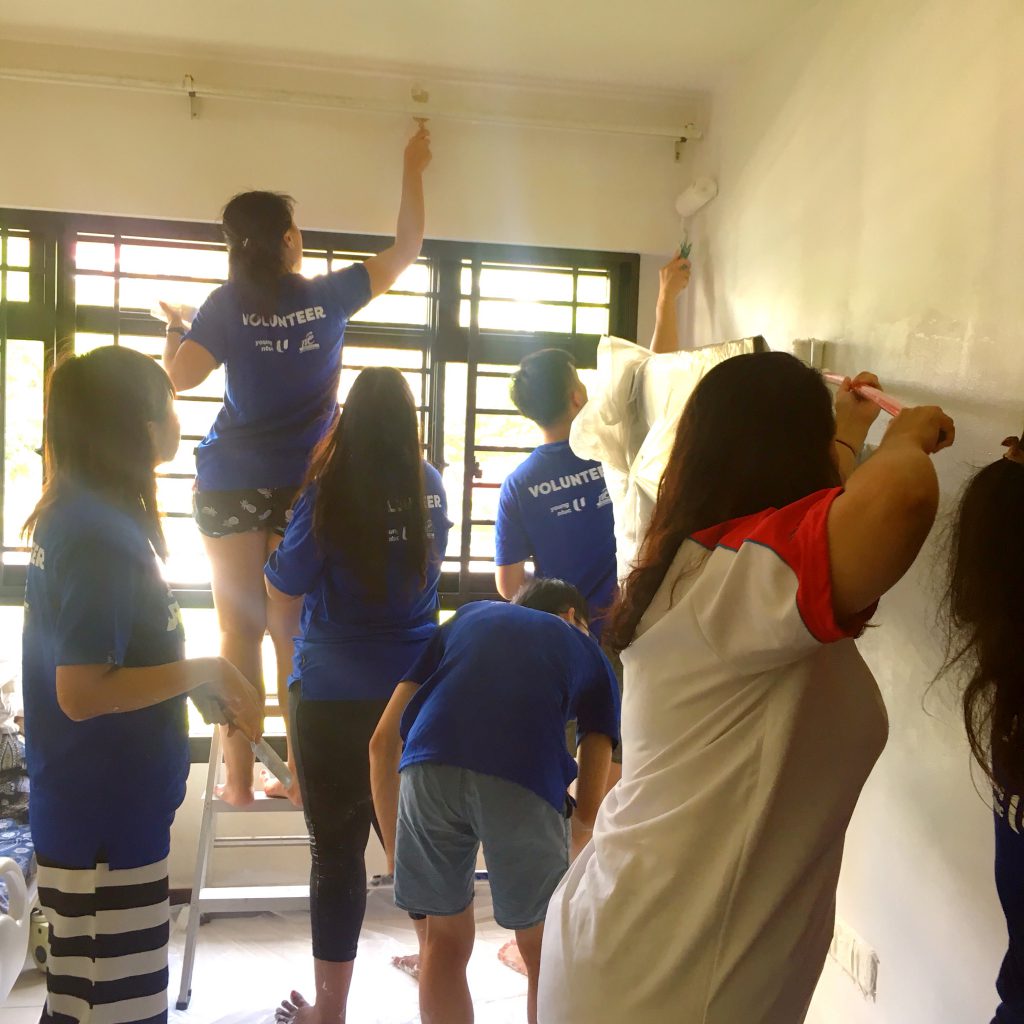
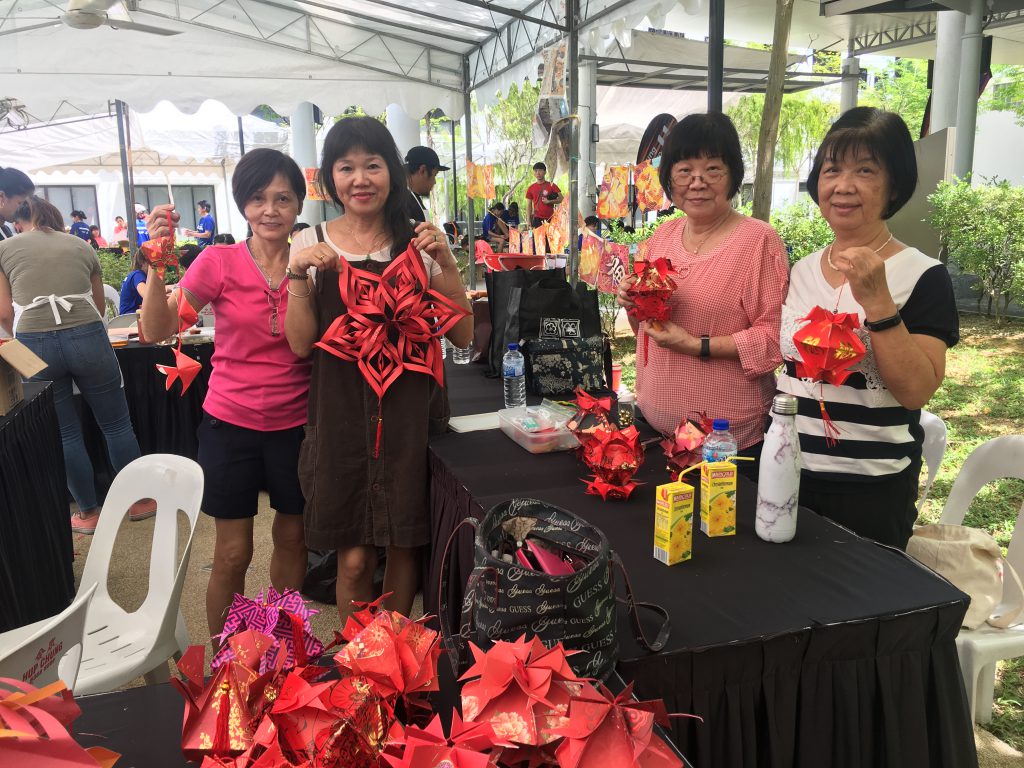
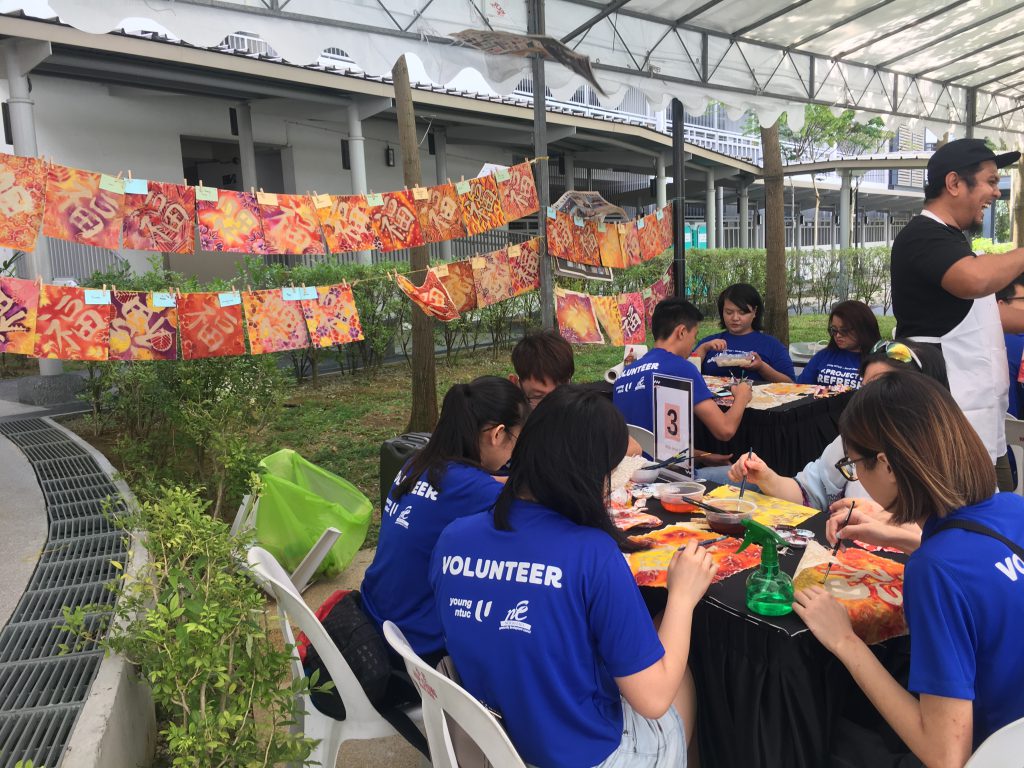
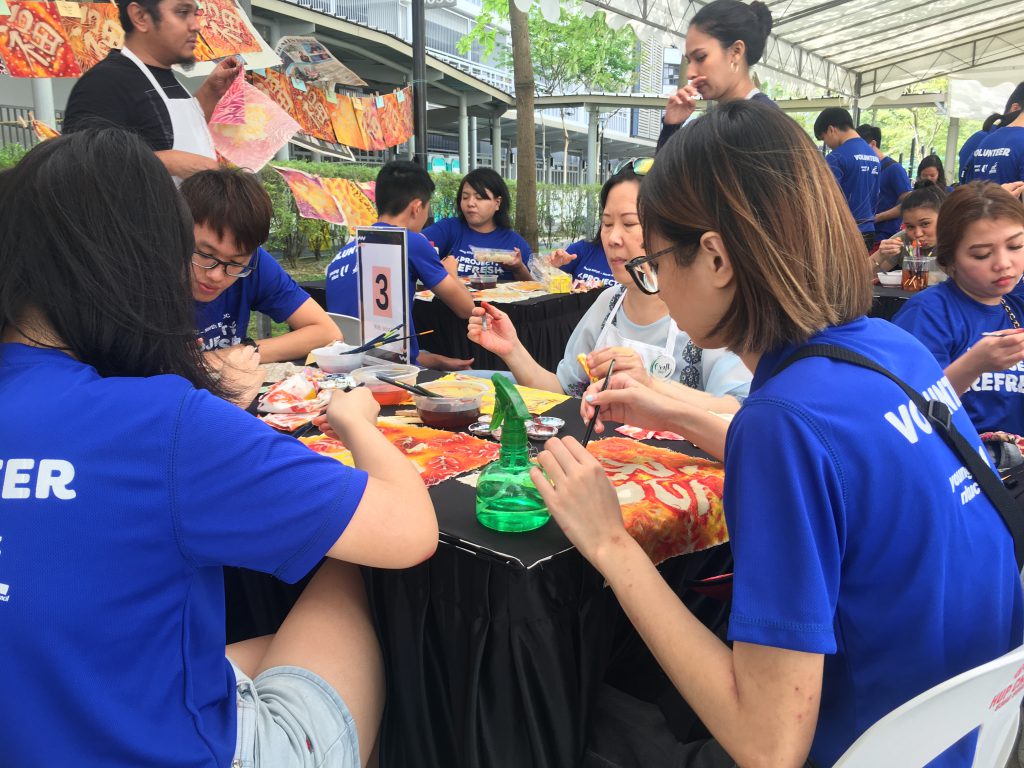
A Reunion Under Lanterns
Molly’s lanterns were later hung at the entrance of Mdm Celeste’s home. The 69-year-old retiree said as she looked up at the lanterns, “I don’t usually put these up,” as she shared about the several falls she has had, and how her bad knee prevents her from taking on any chores that require her to climb or lift heavy loads. Which was why she was especially grateful when a group of bustling volunteers came by to clean her windows, change her curtains, and decorate her home. All of those she had been wanting to do, but are too physically strenuous for her.
“Talking to people feels very ‘shiok’ you know?”
Beyond lending their helping hand, the company of the Project Refresh volunteers were also a significant part of the project to some of the senior residents, and vice versa. “We came here expecting a lot of clutter and many things to do, but her home is actually quite organised already. I think it’s the company that she really misses,” said 29-year-old Zaki. He volunteered expecting a physically taxing morning, but found himself enjoying the conversations with his 67-year-old resident, Madam Mariam. As the secondary school volunteers moved her carpet and mopped the floor, Madam Mariam spoke heartily about her younger days when she ran a food stall. Her sprightly movements left no hint that she had suffered a stroke just two years ago.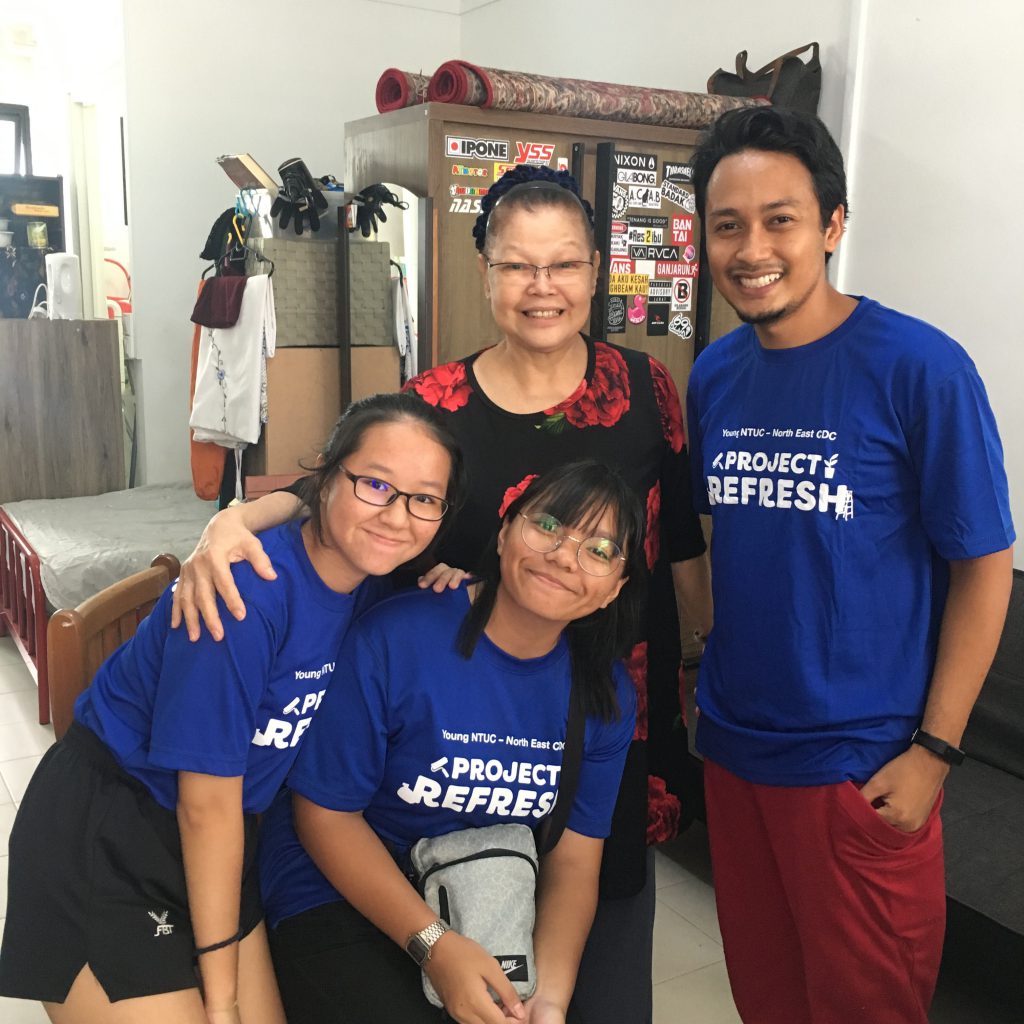
Picking Something Up From The Senior Residents
While the project was directed at giving support to the senior residents, some of the volunteers also found themselves taking away something from the residents they helped. “I have only painted once in my life, for my own house. But it’s patchy,” said Gan, a lecturer and first-time volunteer at Project Refresh. Looking at the patchy paintwork he did for his resident, Abdul Malik’s house walls, he added sheepishly, “just like that.” Little did he know, 64-year-old Malik was actually an apartment painter himself, but has had his movements limited ever since he got a stroke just a few years before. And soon enough, Malik became a painting teacher to Gan and the other volunteers in his home. As he muttered ‘aiyo’s and ‘aiya’s at the inexperienced painters (volunteers) getting paint on their own clothes and even faces, he patiently guided them with technical tips like painting with ‘W’ shaped strokes. “They might not know how to paint properly, but they have the heart. It’s very heartwarming knowing that they can use their morning for anything else but they chose to come here to help. They are very willing to learn also,” said Malik.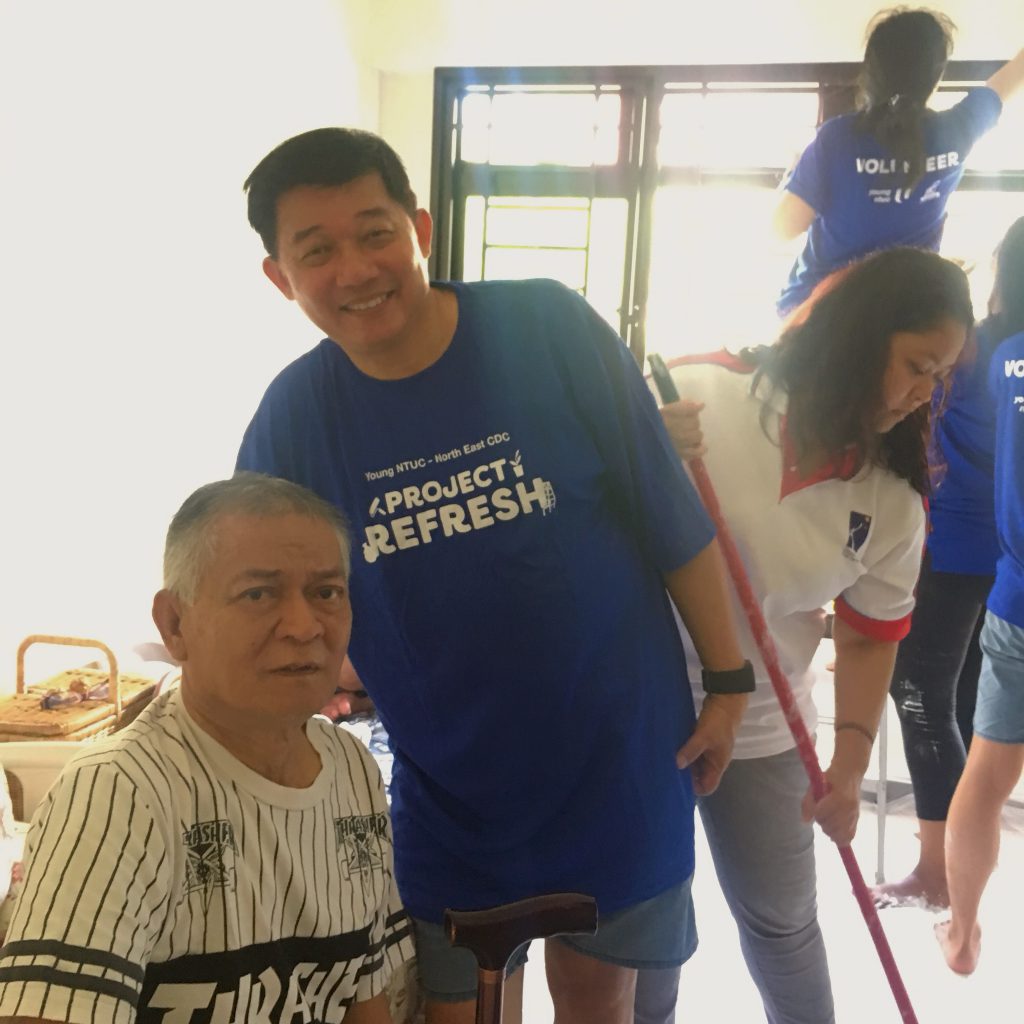
Filling Homes With Warmth
By the end of the day, 96 households received the Project Refresh treatment. In action, the volunteers are there to declutter, clean, paint, and decorate. However, the significance of them there is more than just the physical help. For these senior residents living in isolation, the commotion and presence of volunteers are rare occasions that fills their home with conversations and laughter that they otherwise lack. And for these residents, it was also a perfect start to their Chinese New Year. “They make my house feel like a home,” said Madam Mariam. This article is contributed by Young NTUC. Also read: 65-Year-Old Mdm Rebecca’s Life: A Look At The Reality Of Singapore’s Privilege Gap.But why do we wait until it’s drastic enough to pay attention?
I’ve never had a domestic worker. My mother considered hiring one, but I was against it because “they very smelly.” If I was my mum, I would have slapped that primary school version of me for being such a rude and ignorant kid. I exaggerate, but the point is, it is exactly the little things like this that shows our discrimination against them. There is also this long-standing sense of lowliness that is attached to the work that they do, since they are figuratively ‘bowing their heads down to serve their employer’. The discrimination and the view of them being lowly shows in the way we ridicule them for having picnics with their Bangladeshi boyfriends. It shows in the way we scorn at them for being too boisterous when they’re gathered at Lucky Plaza on Sundays. And it shows when employers ask:“Do I really need to give them an off day?”I cannot vocalise how sad it is when I visit the homes of friends or family and see that the resting spot for their domestic worker is literally that one mattress hidden away at the back of the kitchen, or in a cramped storeroom. From how frequent I’ve seen such arrangements, it seems that this is considered normal. Often, employers find that they do not have a choice as there is no other space in the house for the worker. However, would you put someone up in the storeroom, surrounded by household items, if that someone is a friend or family member? I’d like to think as domestic workers as a part of the family, since they are going to be spending their life with the family, though to some employers, domestic workers are still merely workers. I spoke to a freegan in Singapore, Colin, who runs a project that blesses Filipina domestic workers with dumpster dived items that they or their family back at home can benefit from. He spoke of some alarming things he has heard from these Filipina about their employers. There are employers who would steal their domestic worker’s items. Then, there are employers who would rather cut up clothes they no longer want than pass it on to their domestic worker. I’m making a wild guess that these employers think of domestic workers as unworthy - that these workers cannot possess too many material goods. Whether it’s pride, ego, or some masochistic need to assert their authority, I do not know. A lot of us are also uncomfortable with the idea of our domestic workers having their own social life here. Similar to how we don’t like to think of our own family member and their sexual relationships, it is hard to think about our helper getting involved that way. It’s also a worry that their romantic relationships get in the way of them performing on their job. Though, the most alarming of it all is when employers practice superiority in their everyday actions. My mother was once approached by our neighbour’s domestic worker in the lift, who asked my mother if we had any leftover food we could give her. Upon probing, my mother learnt that the domestic worker was only allowed to eat the family’s leftovers (if there are even any). They even bought a separate loaf of bread just for her, as they did not want her to be eating the same food the family eats. It was a shocking discovery. Not just because it is a family that has been living right beside us all this while, but because we couldn’t tell at all. We couldn’t tell that beneath the facade of a friendly family with two toddlers and a grandmother, they would do such a thing as to locking their domestic worker at home alone when they go on holiday. Colin had also told me about having met this Filipina who was so happy to receive a plain plastic cup that is of no value to most people. This domestic worker was scolded for using a cup to drink water on the first day she was at her employer’s home - the employer told her that these cups are theirs, and that she is not allowed to use their cups.
There Are Horror Stories Of These Workers Too
Although, just like domestic worker abuse cases, there has been many cases of errant domestic workers as well. There was the domestic worker who killed a baby because the baby couldn’t stop crying, another who got jailed for hitting her employer’s elderly mother, and one who sexually exploited her employer’s underaged son. A colleague’s aunt rehired a domestic worker who had worked for her family for 10 years previously and left to find another job. The domestic worker had wanted to work for them again as she said other places mistreated her. The family took her in out of goodwill, only to find out a year later that she had been stealing items from their house. My aunt had a fear of maids because of the many horror stories. She hired one after much deliberation, as motherhood and household chore got overwhelming. She ended up with a problematic maid, who would sneak her lover into the house for some fun when she was home alone. Talk about the laws of attraction, huh.It's a reflection of ourselves
These cases of domestic workers misbehaving are just as terrifying, and they can really undermine our confidence in them. Another colleague spoke about how her grandma would treat their maid badly because of a nasty experience with a previous domestic worker. Because the last domestic worker argued with the grandma a lot and called her names like ‘stupid’, the grandma now behaves the same way towards the current maid. It’s inevitable that we have our guard up when we meet domestic workers that go rogue. But if one is really so suay to hire a domestic worker who has potentially errant tendencies, treating them badly is only going to incite them to misbehave. And exactly because domestic workers are humans too, there will always be black sheeps. The horror stories may give us a certain amount of prejudice against them, but it should not stop us from being humane. Seeing them as inferior or not worthy of respect is not only an unreasonable generalisation of domestic workers, it reflects our ignorance and narrow-mindedness. Punishing them to the point of abuse on grounds that they did not perform well makes us no better than the slave-drivers in stories we hear about the ancient times. On the other hand, there are so many more hardworking domestic workers who grow to be a crucial part of their Singaporean family. My cousin’s family maid, Parti, has been with them for 16 years now and is pretty much a part of our family. Parti has seen my cousin, S, through the formative years of her life, and even though my cousin knows that Parti will leave for home one day, it is still a painful prospect for S. “Recently, there’s been talk about Parti going home for good. I was really upset and affected by that. It’s akin to a family leaving. I know she can’t be with me for life but at the same time, I’m still really sad. But I’m grateful too, because she had to give up her own family to come over here to work. Hopefully, during all these years, I was able to be a part-time family to her as well.” Like Parti, many domestic workers leave their home to come here to earn a living. They sell their own youth and life to work so their own children, parents, or spouse back at home can have a better life. Many end up working for their employer’s family for so long that bonds are forged. An annual ceremony organised by the Association of Employment Agencies awarded 19 pairs of maids with long-service award - One Filipina was honoured (longest-serving maid) for having worked for the same family for 28 years. We are only here because we are lucky enough to be born at a place more affluent. At the end of the day, these maids are but young women who have left their home in search of better opportunities. We could have easily been them. Just like how we ‘sell our life away’ in our office on Mondays to Fridays to make a living, the maids do too, only, they are selling their life away to earn money. They sell their youth and life away so they can feed their families back at home. The least we can do is to treat them with dignity and compassion.A previous version of this article included a sentence that can be misunderstood to imply that employers should not feed domestic workers cheaper food. We have made amendments to address that error.
Also read: We Live Under One Roof, But We Don’t Feel Like Family At All. (Header Image: Flora Isabelle)Digging Through Trash?!
As the term suggest, dumpster diving is digging through dumpsters to salvage useful items. In other words, finding treasure in someone else’s trash. Some do it to save money, some do it to save the environment, some do it for charitable reasons, and some, just for the fun of it. Since dumpster diving in Singapore started getting more attention two years ago, more Singaporeans are opening up to it. But even with the increasing interest, Singaporeans still largely perceive dumpster diving to be a bizarre activity. “Why do people even want to dig through trash?” “Only poor people need to dumpster dive.” “Can find anything good from dumpsters meh? If it’s still good why will people throw it away?” However, as shared by the co-founder of Freegan in Singapore, Colin, “people have the wrong idea that everything in the trash is worthless.”The Man Behind ‘Freegan In Singapore’
Ever since he started dumpster diving in 2016, Colin has found valuable items that we would never have thought we would find in dumpsters. Electronics like television sets, mobile phones, and ovens are common finds, so are kitchenware and perfect condition furniture. He has also found hundreds of branded bags before from Prada, Louis Vuitton, Coach, and Gucci. Besides small defects, most of these bags are still in good, working condition when he found them in the dumpsters. For example, one of the bags he found had a broken zipper pull tab which he simply replaced with a twist tie - “the kind from the bread from bakeries.” In a post he wrote on Freegan in Singapore recently, a Facebook page he co-founded, Colin added that “when people shift, renovate, spring clean or have a recently deceased loved one, they will throw away amazing items in perfect condition.” As a leader of the freegan community here, which has close to 7,500 members in its Facebook group, Colin has trained and is still training disciples to continue the work of dumpster diving for charitable reasons and advocating the freegan lifestyle.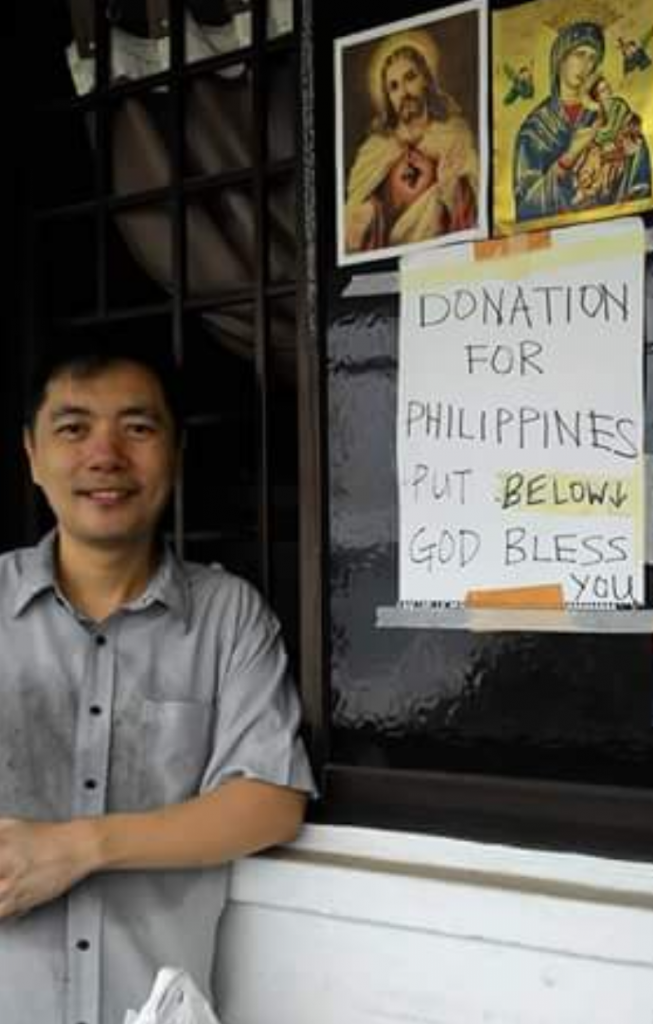
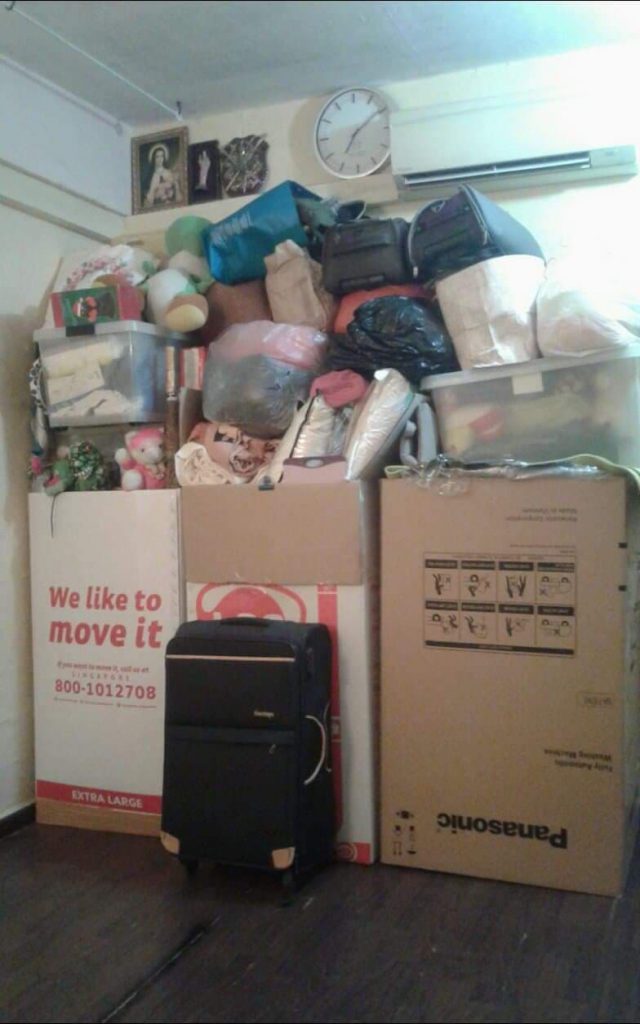
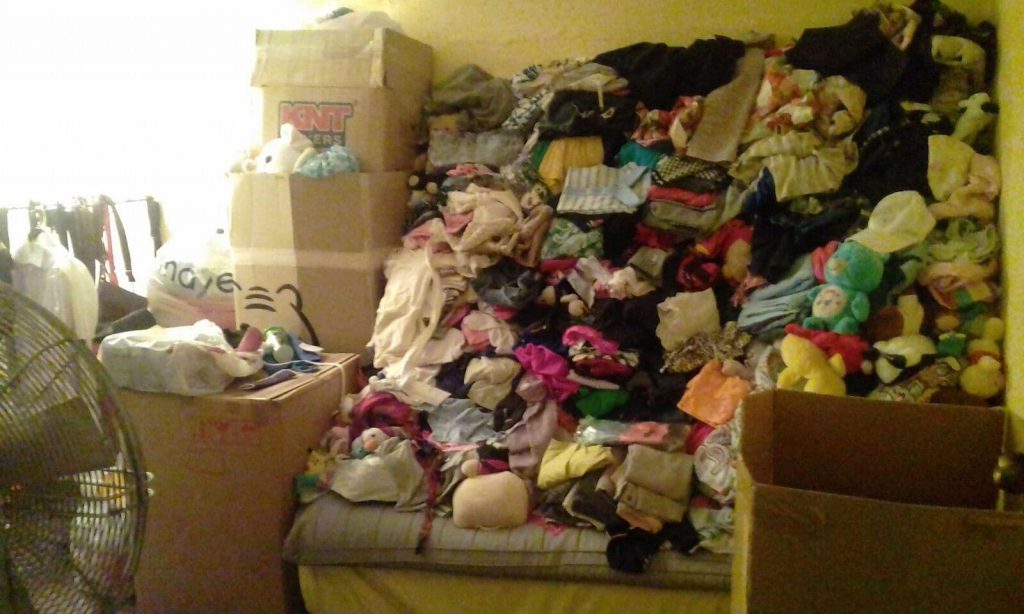
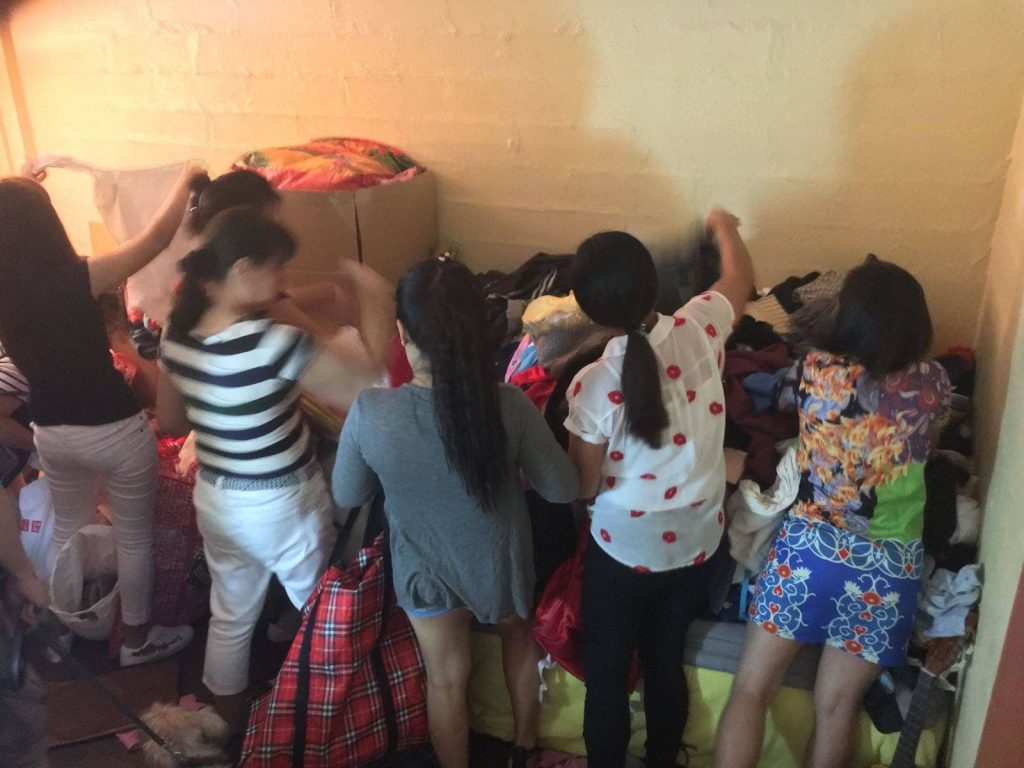
“I didn’t even dare to do it initially! I watch a lot of videos until I’m very sure and got the PHD already then I went to try.”Colin later found that his food, merchandise, and monthly expenses dropped to less than $100 after he started dumpster diving. The beginning of the Filiporean Project came on his fourth day, when he took home a bag of good quality female clothes, which was later passed on to a Filipina.
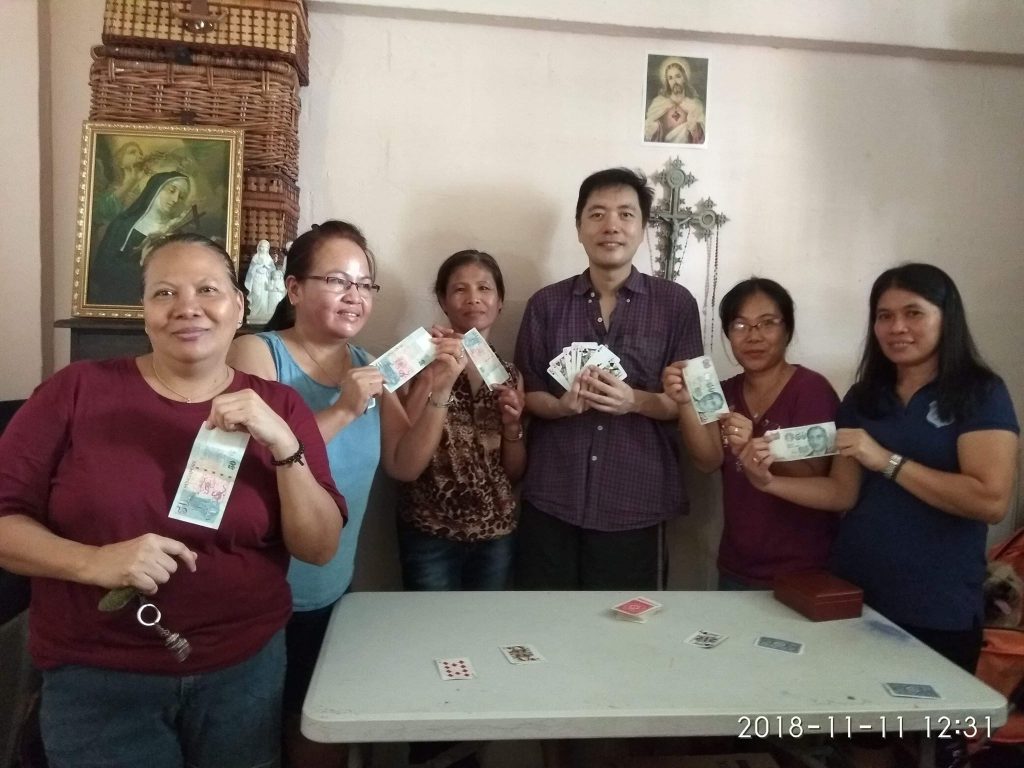

Rescuing Food
Like what Colin does for merchandises, Daniel does for food.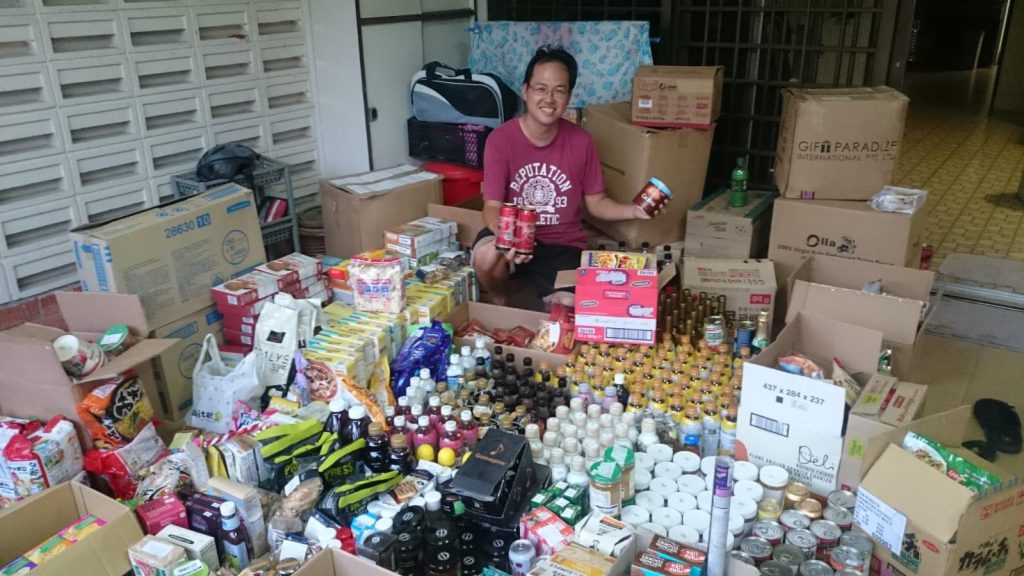

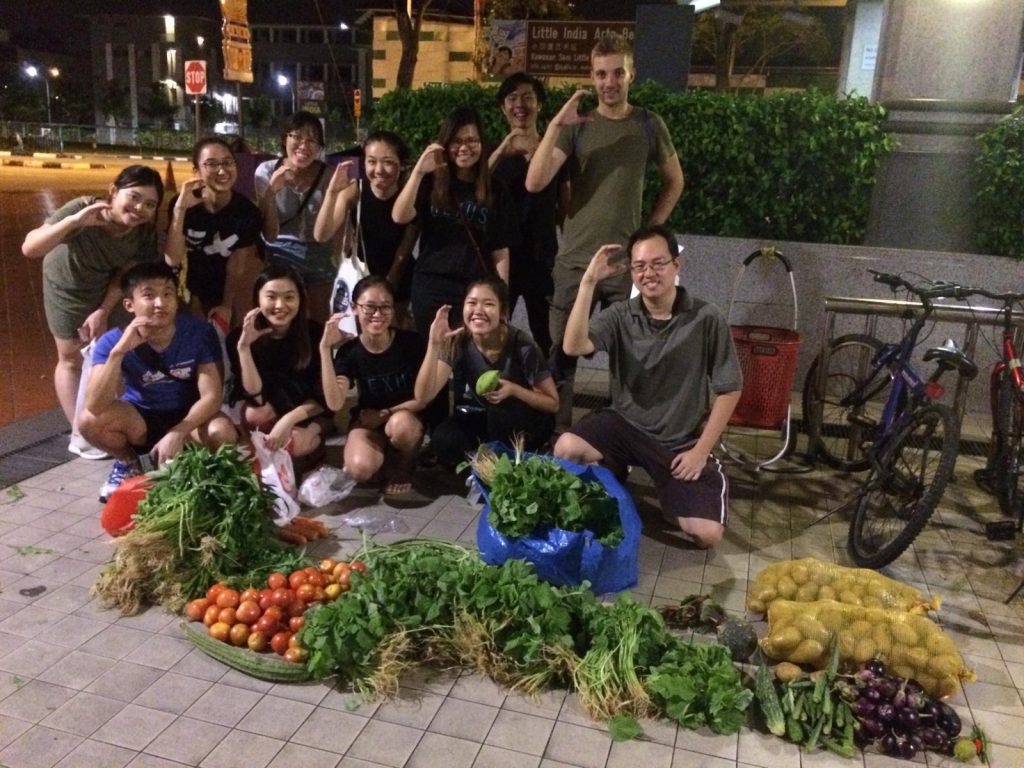
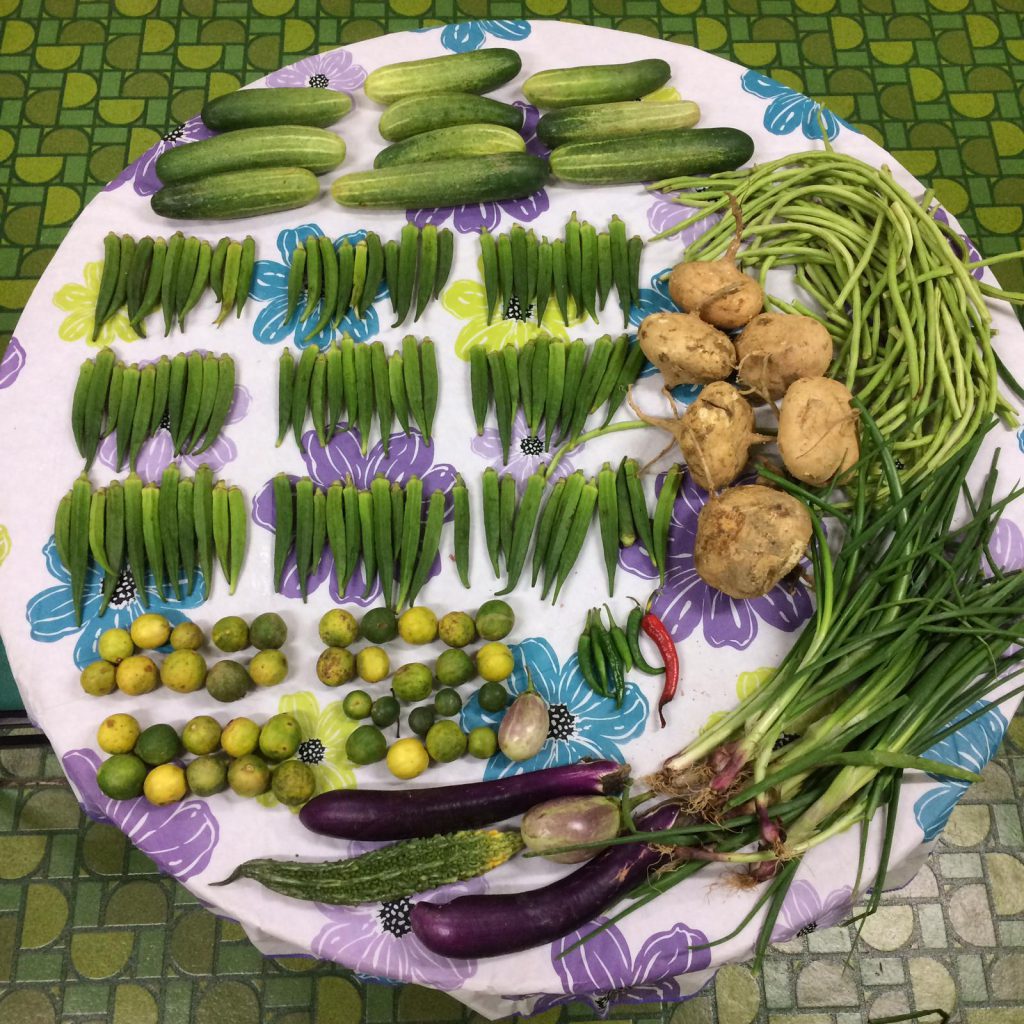
“A freegan is someone who rejects consumerism and seeks to reduce waste, especially by retrieving and reusing discarded items.”As defined in the Facebook group and reiterated by both Colin and Daniel, freegans do see the need to spend money on things that they can get for free. In the middle of my interview with Daniel at McDonald’s, he got up suddenly, “wait ah, wait ah,” only to return with a used straw, which he proceeded to wipe with paper napkins before using it to stir his cup of tea. He explained how this is one of the many things that encompasses the freegan philosophy. “You’re signalling to the company that they need to put more straws, but that’s not good for the environment. But if you take one that somebody has already used, you’re not creating any more demand.” While Daniel’s rationale made sense, I couldn’t help but feel uncomfortable thinking about the possibility of contamination. Who knows what people do with straws, or their utensils, or food after they are done with it. I shuddered at that thought, but also felt guilty for my nonchalance in using plastics. On the flipside, Daniel had only ever gotten food poisoning from food that was bought. “Because I know it’s rescued food, I’m a lot more stringent and careful.” As a general practice, freegans like Daniel practice the Look-Smell-Taste test method to determine whether a certain food product is safe to eat. Obviously, meat with maggots crawling around is out of the question, and for Daniel, so are dented, rusty, or bloated cans of food. Expired food however, are one of the common foods that freegans rescue for consumption. As Colin best puts it, “Most [locals] think that food spoils one second after midnight of the best before date. But we freegans believe that food is not equipped with a self destructive device that can activate itself at the stroke of midnight of the expiry date. Daniel had even had 12-years-expired chicken essence. Even though the initial thought of consuming something that has expired for 12 years did make his stomach churn, Daniel explains that it is most a psychological reaction that can be overcome by testing it out. As leaders in the dumpster diving and freegan community, Colin and Daniel are what Colin refers to as ‘Rambo dumpster divers’ who map out their attack route, and dig and grab every good thing they see.
Dumpster Diving As A Hobby
Then, there is the second type of dumpster divers which make up the bulk of the community - the ‘casual encounter’ type. And we met one such casual encounter dumpster diver last month: Bianca.https://www.facebook.com/millennialsofsingapore/videos/604032170054484/
A fellow millennial in her first full-time job as a teacher, Bianca usually dumpster dives with her boyfriend. Although their dumpster diving ‘trips’ are never planned, Bianca has found herself rescuing bags of clothes and assortments of housewares for her family, boyfriend, friends, and herself. “It’s usually when we are walking to my block from the bus stop for example, and we’ll just check the bins along the way.” Bianca also often does barter trades and gives away rescued items on the various dumpster diving and freegan groups online. Unlike Colin and Daniel who started for practical reasons, Bianca’s interest in dumpster diving germinated from a concern for the environment. “The whole thing started when I watched some PETA videos in Secondary school. I started realising that whatever we consume, be it shampoo, soap, or anything we use on a daily basis, have an impact on the environment.” Knowing that her spending money on certain companies indirectly supports them in their cruel practices, Bianca began to switch to companies which are ethically or environmentally conscious in their business practices. It was when she went on a ‘clothes fast’ in 2016 to curb her shopping addiction when she realised that she didn’t need a lot of material goods in her life. “I didn’t buy any clothes for one year. Dumpster diving came along shortly after the clothes fast. I realised that if I can do with fewer clothes, I can do with fewer things. At the same time, I thought, maybe I don’t need to buy stuff, I can just look out for free stuff.”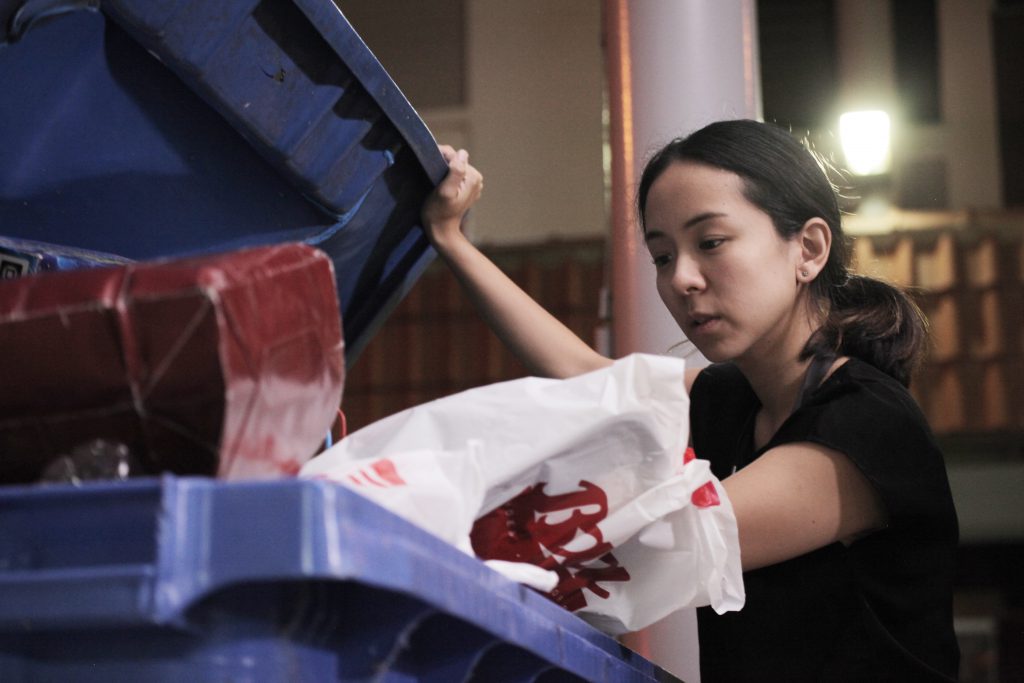
Here’s What Went Down
On Monday, a landmark high court case has allowed a gay Singaporean man, who’s a pathologist, to legally adopt his own surrogate son. He had wanted to adopt a child together with his long-time gay partner, but was told by the Ministry of Social and Family Development (MSF) that this was unlikely because of their sexuality. The pathologist then went to United States (US) and paid US$200,000 for in-vitro fertilisation (IVF) procedures. He successfully fathered a son in 2013 through surrogacy arrangements. He brought his son back and applied to adopt his son but was rejected by a district court last year. Judges maintained that the pathologist was attempting to (in other words) ‘find a loophole to legally adopt his child despite the existing laws that are preventing it’. The pathologist appealed his case. The case was brought to the High Court (Family Division), which, on Monday, approved his appeal to legally adopt his biological son as a single parent.Why The Adoption Was Allowed Even Though It Violates Public Policies
Singapore has always been known for having a no-nonsense attitude towards law enforcement. So, the fact that the court ruled (in a way) against certain public policies is a pretty big thing. In particular, the judges had to weigh the concerns of Singapore’s public policies of parenthood within marriage, and against the formation of a family with same-sex parents. Ultimately, the judges ruled in favour of the adoption as they found the welfare of the child paramount, and that the adoption will contribute to enhancing the child’s sense of security and emotional well-being, and care arrangements. Although, the three-judge court stressed that the decision was made based on the facts of the case and in accordance to the law, not on any emotional grounds: "Our decision was reached through an application of the law as we understood it to be, and not on the basis of our sympathies for the position of either party," Chief Justice Sundaresh Menon wrote on behalf of the court.


 GIF from GIPHY
The fact that it is such a foreign concept also made me think of the worst that can happen, and I sure as hell didn’t want to end up bankrupt from uninformed investment choices at such a young age.
GIF from GIPHY
The fact that it is such a foreign concept also made me think of the worst that can happen, and I sure as hell didn’t want to end up bankrupt from uninformed investment choices at such a young age.
So How Did People Actually Get Into It?
Curious to see how some of my peers got started in their foray, I checked in with two of my friends who’ve invested in some stocks since their early twenties. Exactly like how many of us who haven’t started investing would feel, the main struggle that 26-year-old Daniel faced when he started investing at 20 is finding the initial courage to do it. Fortunately for him, a degree in finance and capital from a father who is quite an avid investor gave him a head start. For the rest of us who aren’t that lucky in that sense, it’s hard to start because we don’t even know what we don’t know - which is pretty much the most helpless state one could be in. GIF from GIPHY
However, like what DollarsAndSense.sg wrote in an article about investing with just $100 a month in Singapore, “Setting aside a large sum of money and acquiring extensive knowledge before you actually start investing is not only unnecessary and impractical, it may not even be the ideal situation.”
As for 26-year-old Billy who paid to learn from investment courses, his challenges were figuring out what stocks to buy and which platform to use when he first got started at 22. And it was a nerve-wrecking process of trial and error before he got the hang of things.
Even for Daniel and Billy today, they still find themselves lacking time to monitor their investments.
That’s where technology like the new robo-investing service comes in.
GIF from GIPHY
However, like what DollarsAndSense.sg wrote in an article about investing with just $100 a month in Singapore, “Setting aside a large sum of money and acquiring extensive knowledge before you actually start investing is not only unnecessary and impractical, it may not even be the ideal situation.”
As for 26-year-old Billy who paid to learn from investment courses, his challenges were figuring out what stocks to buy and which platform to use when he first got started at 22. And it was a nerve-wrecking process of trial and error before he got the hang of things.
Even for Daniel and Billy today, they still find themselves lacking time to monitor their investments.
That’s where technology like the new robo-investing service comes in.
A Gem For Beginners And The Time-Starved
As the name suggests, robo-investing works like a virtual consultant and is basically an online investment advisor that uses algorithm to monitor your investing portfolio. The automated digital investment platform will help match your needs and preferences to portfolios best suited for you. In other words, your ‘digital assistant’ will recommend portfolios to you so you can get the best possible returns. One such robo-investing service available in Singapore is OCBC RoboInvest. Whether you’re new to investing or want to invest but are too busy to do so, OCBC RoboInvest helps you invest and grow your savings with minimum effort. The first of its kind offered by a bank in Singapore, it’s an investment platform that lets you choose your preferred portfolio and uses algorithms to track and rebalance your investment portfolios, with your approval.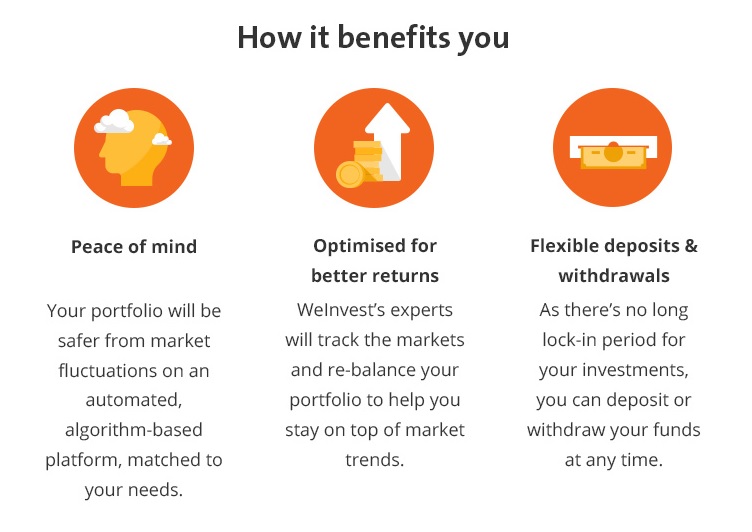

Going Against The Will Of His Only Family
Most of us will have no qualms going against our parents once in awhile because after all, our growing up phase also meant us wanting to ‘live a little’. For Ludfee, things are different, because he never had parents. Ever since his parents left him at the hospital after he was born, his grandparents have been his only family. He never knew who his mother or father were, how they look like, or why they abandoned him, but as I chatted with Ludfee, I deduced that he is someone who chooses to look on the bright side of things. “I wouldn’t wish that things were different. I prefer staying with my grandma actually, because I’ve heard about friends having to face strict curfews and rules from their parents. My grandma isn’t very strict, which I’m grateful for. But she nags about religion.” Making the decision to pursue music wasn’t easy back at home as his grandmother wanted him to take a ‘traditional route’ in business. He wanted to study Digital Audio Video Production, but went for businesses services at ITE College Central in the end so as not to complicate matters at home. Nonetheless, arguments with his grandmother still happen from time to time. “My grandma would always say that my priorities are wrong and that I’m choosing music over religion. It gets tiring to have to argue about this again and again.” Ludfee explained how he has had to forgo events like family dinners or religious gatherings for competition trainings or performance rehearsals. However, he tries to ‘lessen the burden’ as much as possible, like taking up a barista job after secondary school to earn his own keep and to fund his own music pursuits. “My grandma have somewhat of an income as she works at a food stall with her friends. But I want to earn some money for myself and for my music instead of relying on her.”Making It Work
Like all musicians in Singapore, Ludfee knew that it wasn’t going to be an easy route. With a cappella group, That Acappella Group (T.A.G), he has gotten many performance opportunities including singing for our President and also competing in this year's National A Cappella Championships, where they have been crowned the winner and 1st Runner-up in the College Category.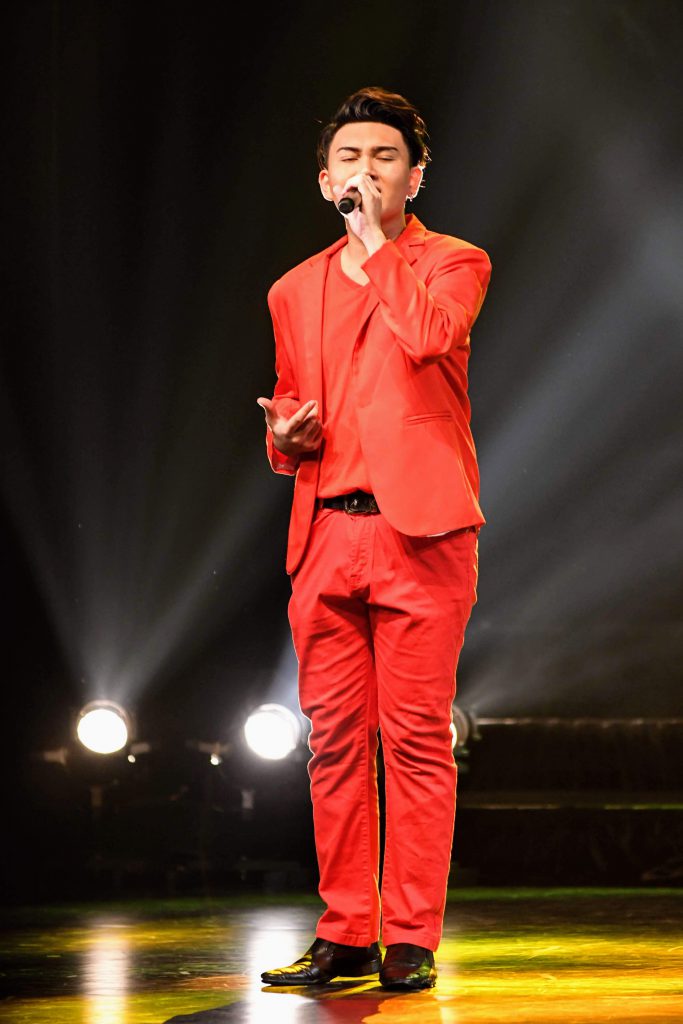

Support Our Local Talents At Voices
Although Ludfee has big dreams of publishing his own music and also sharing his interest as a music teacher in the future, his current goal is getting more publicity and appreciation for his music. Catch Ludfee at Voices – A Festival of Song at Esplanade - Theatres on the Bay this 7 to 9 December, where he will be performing with T.A.G as the lead bass singer, and also tenor and alto with Sticks & Kebab!
